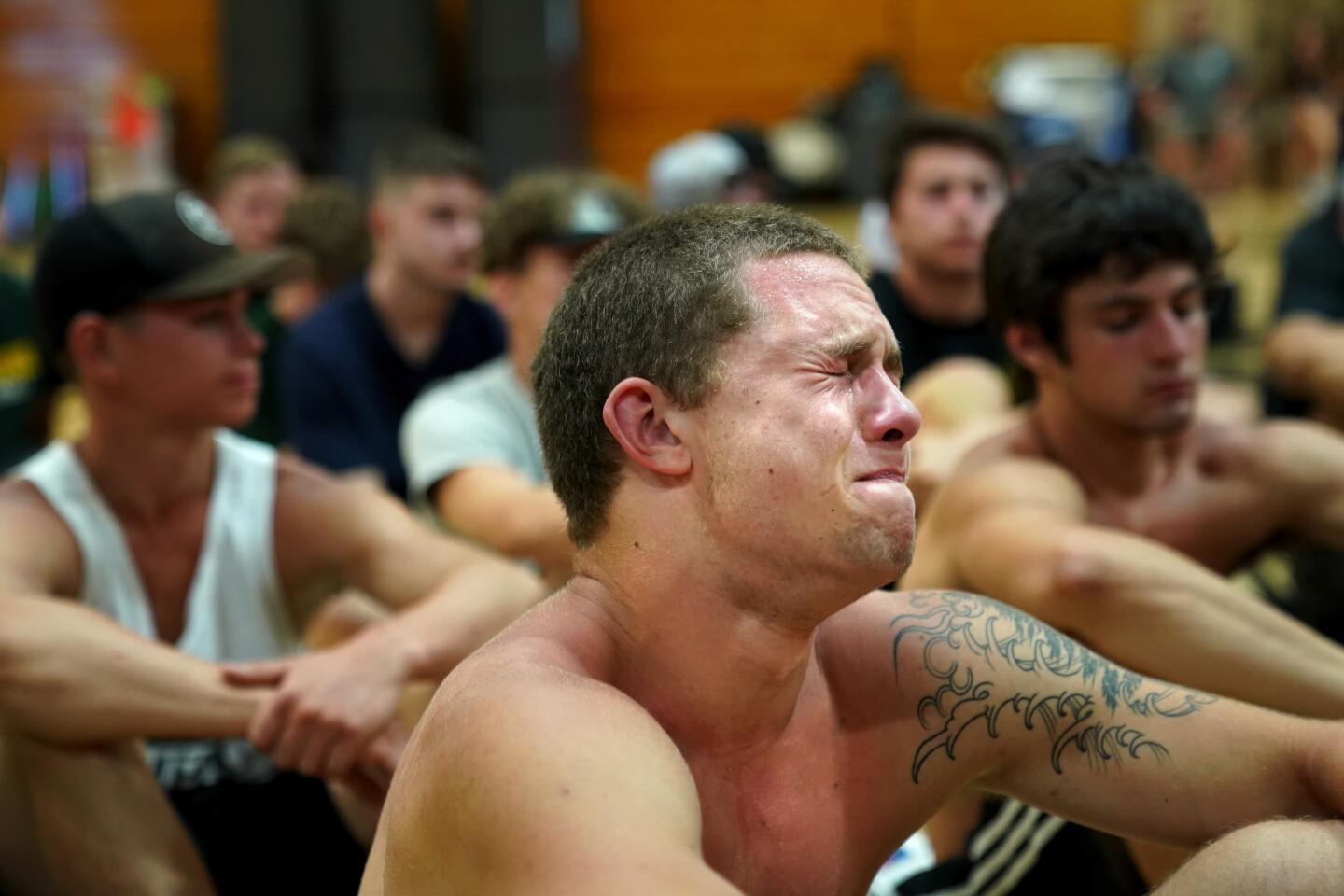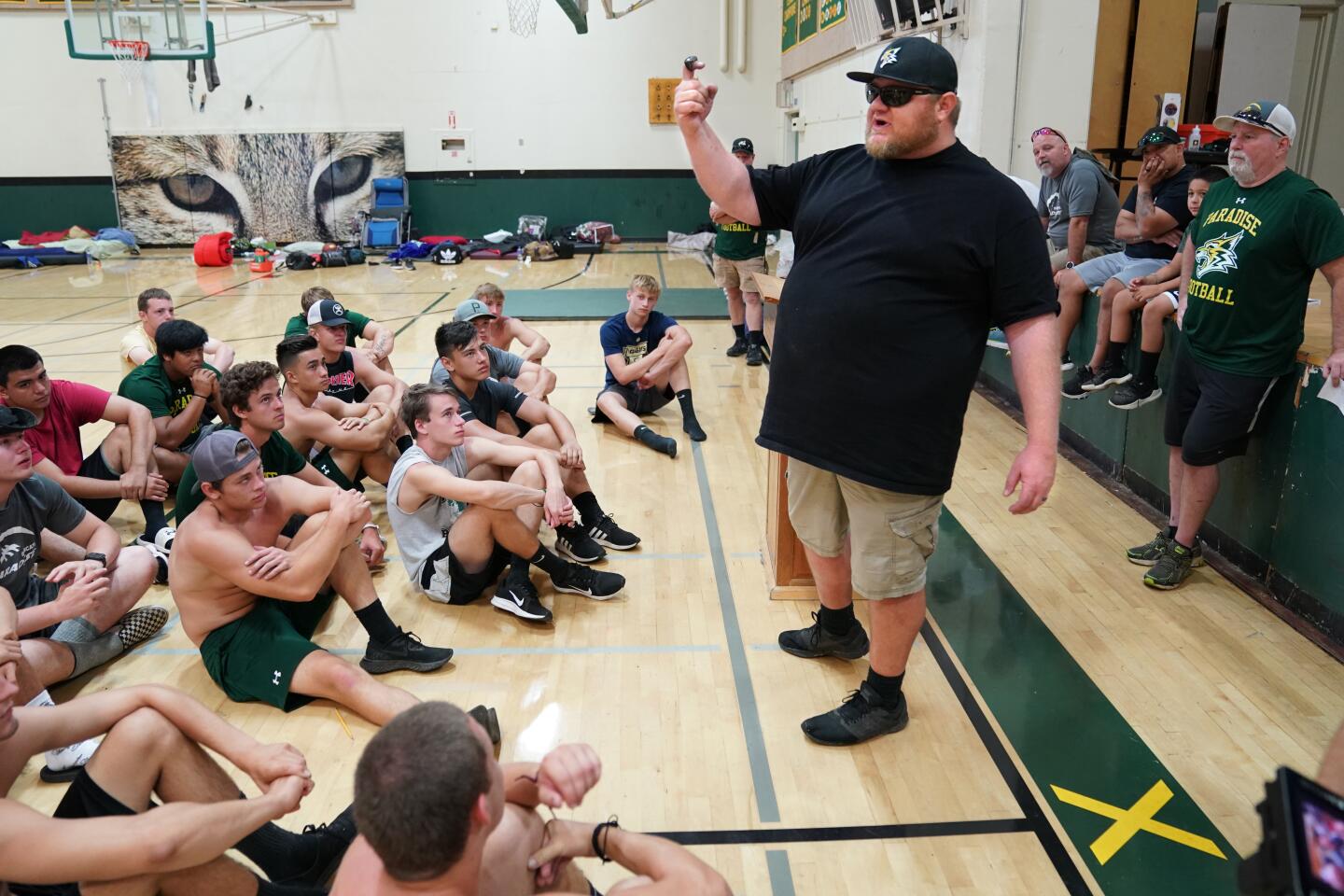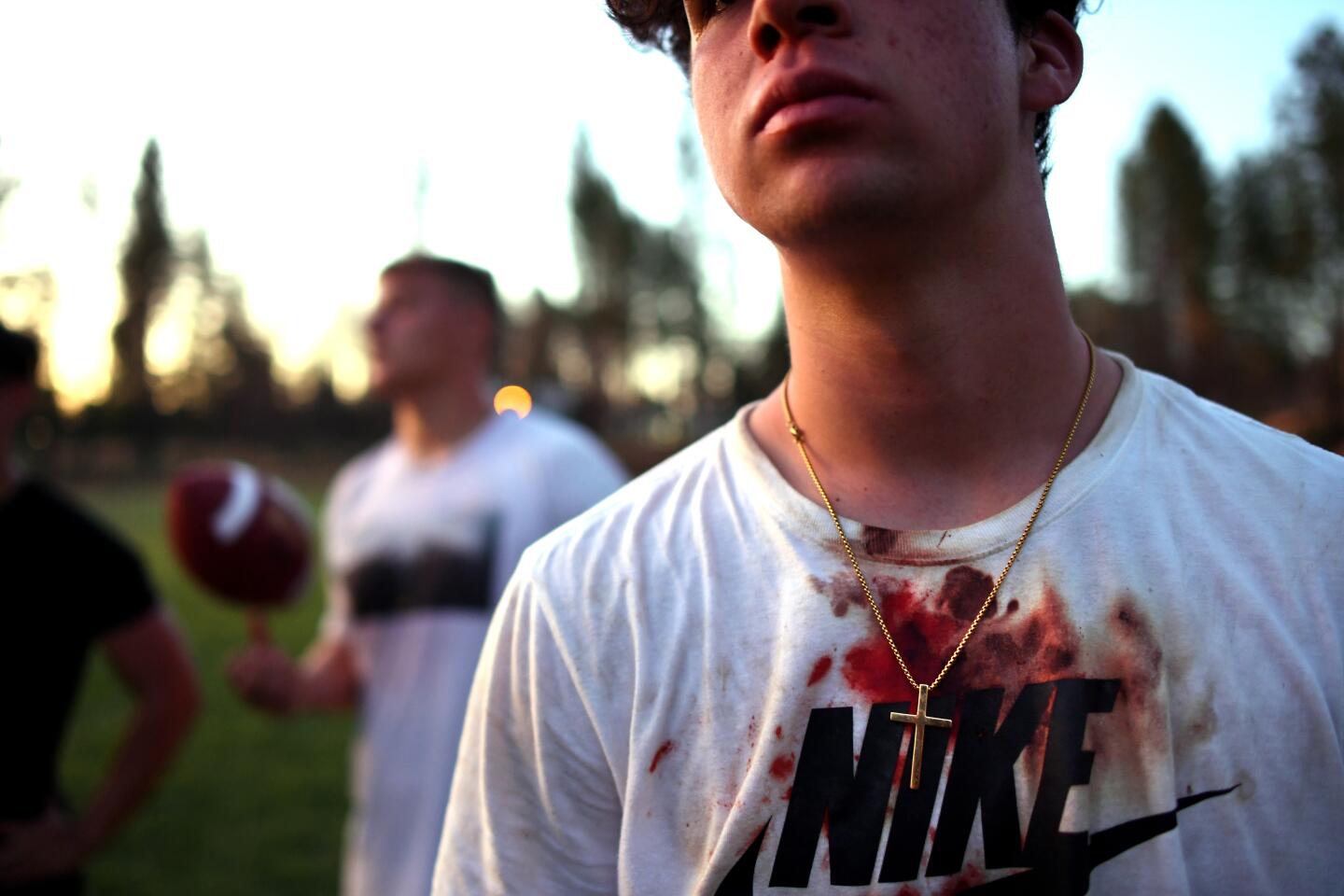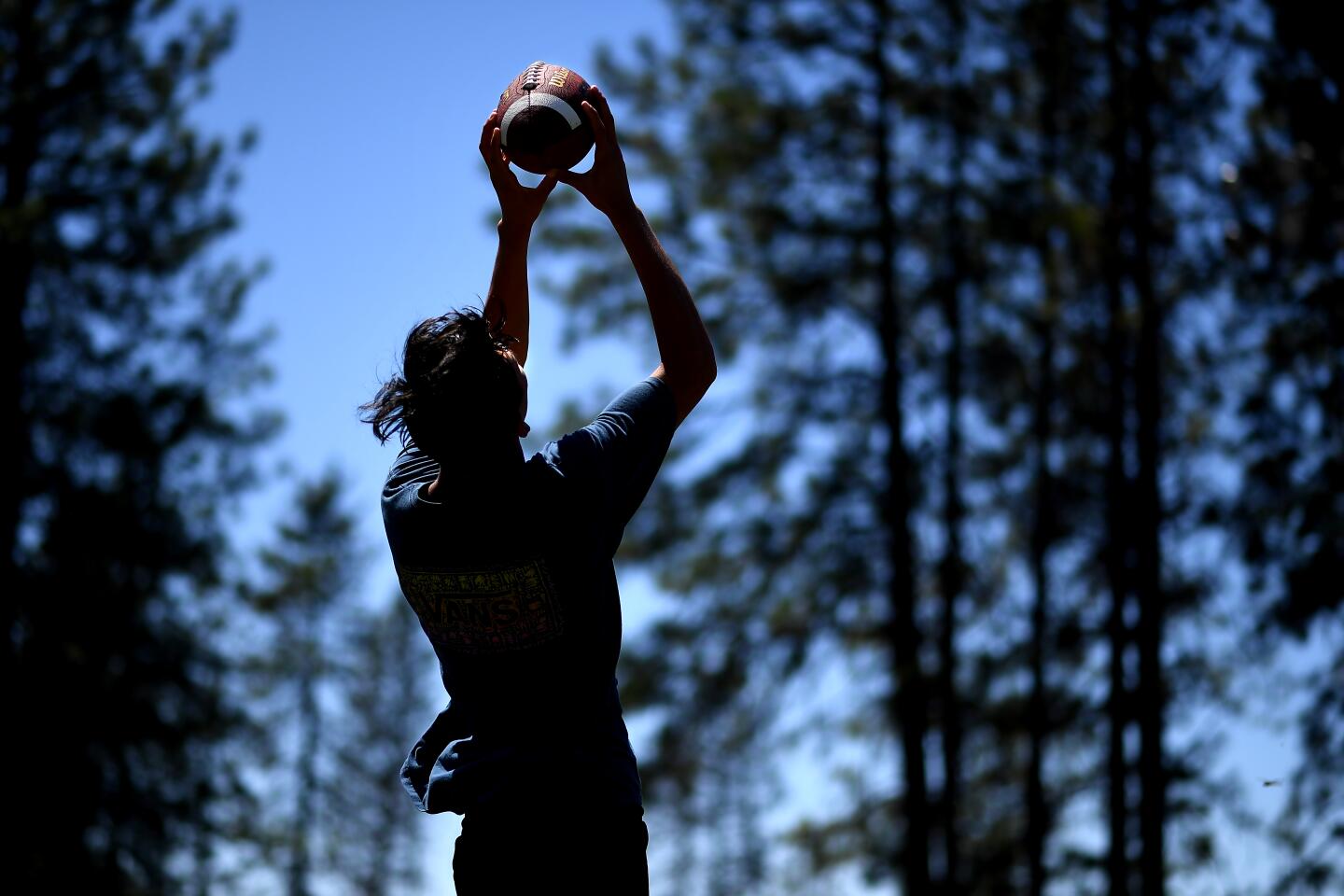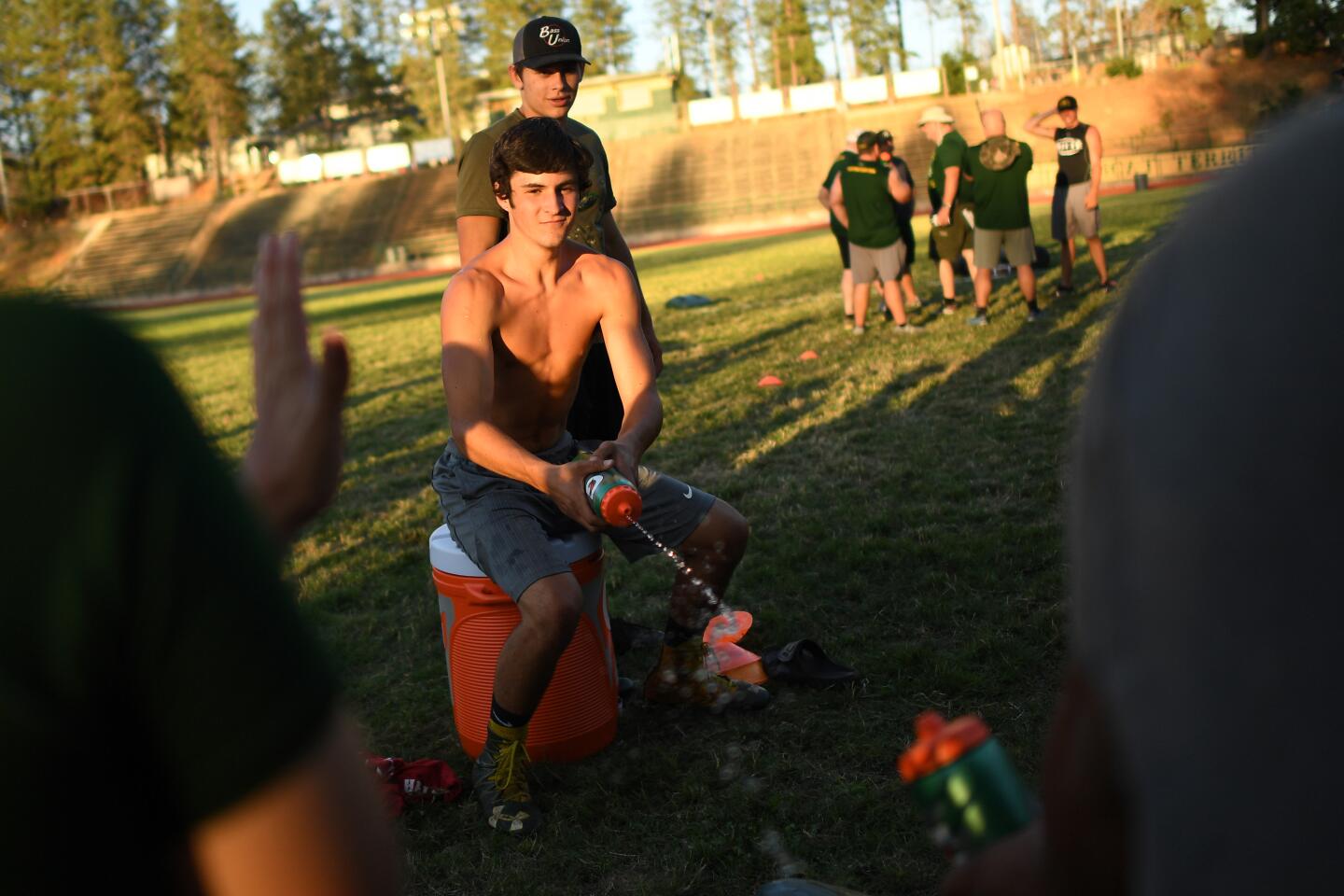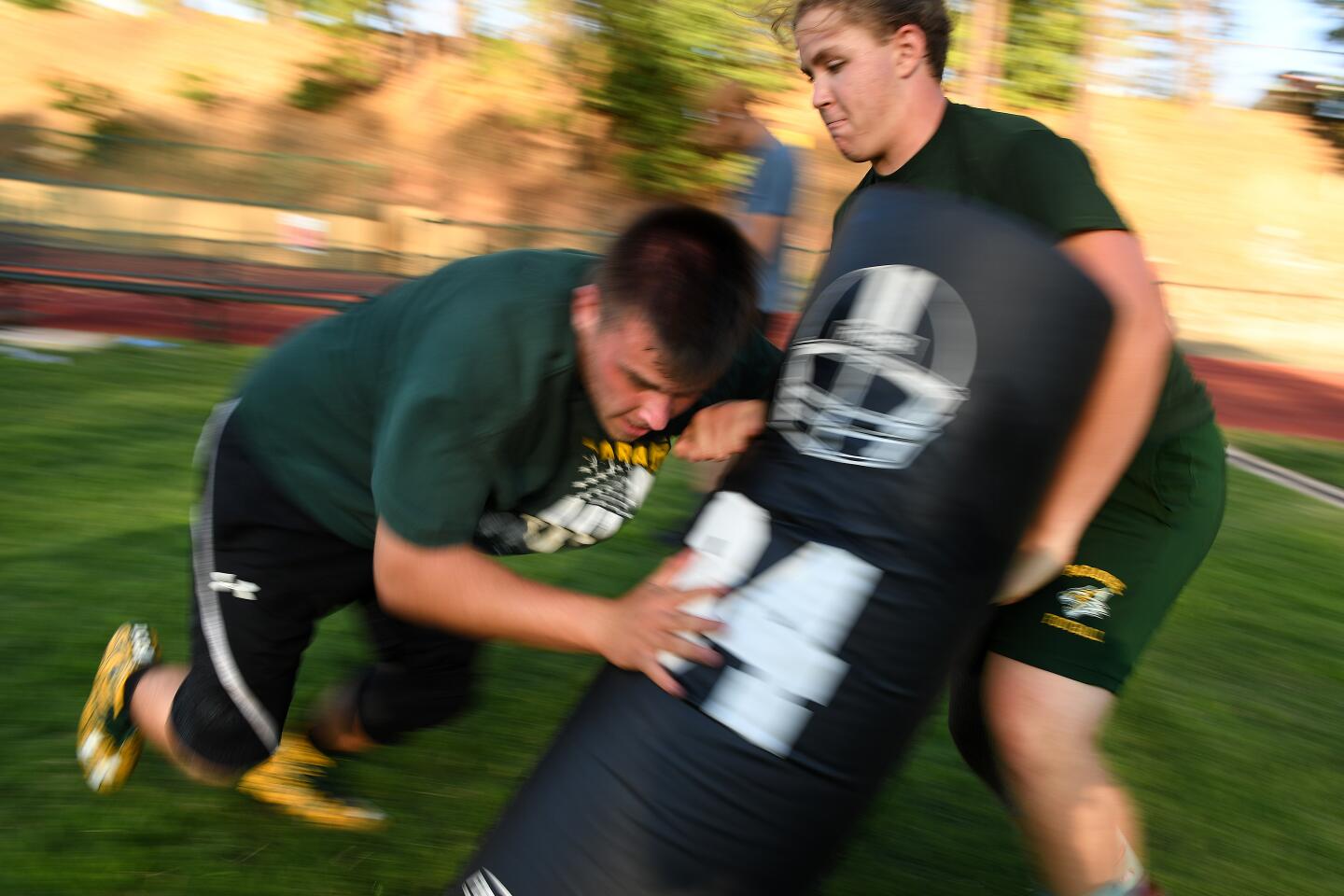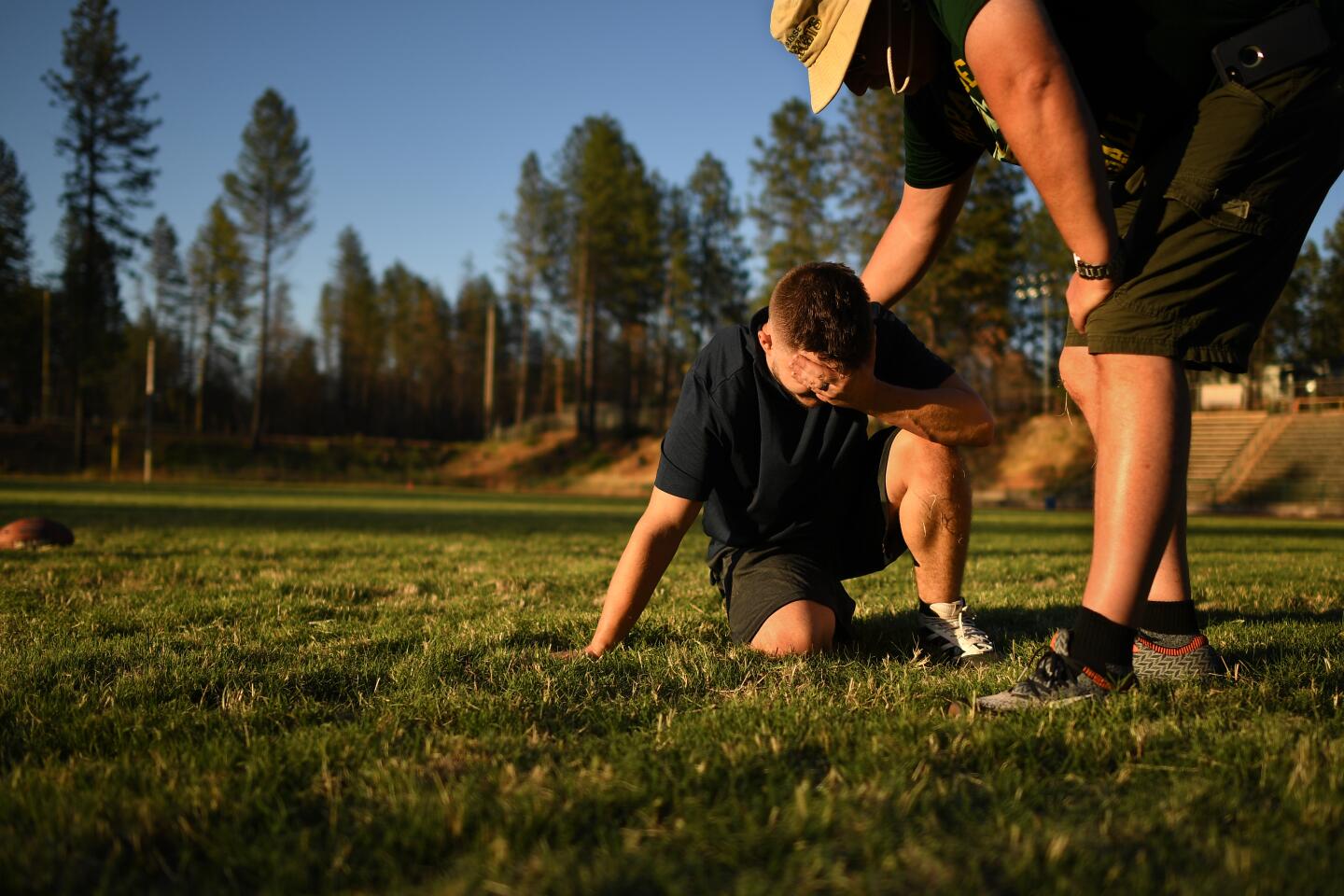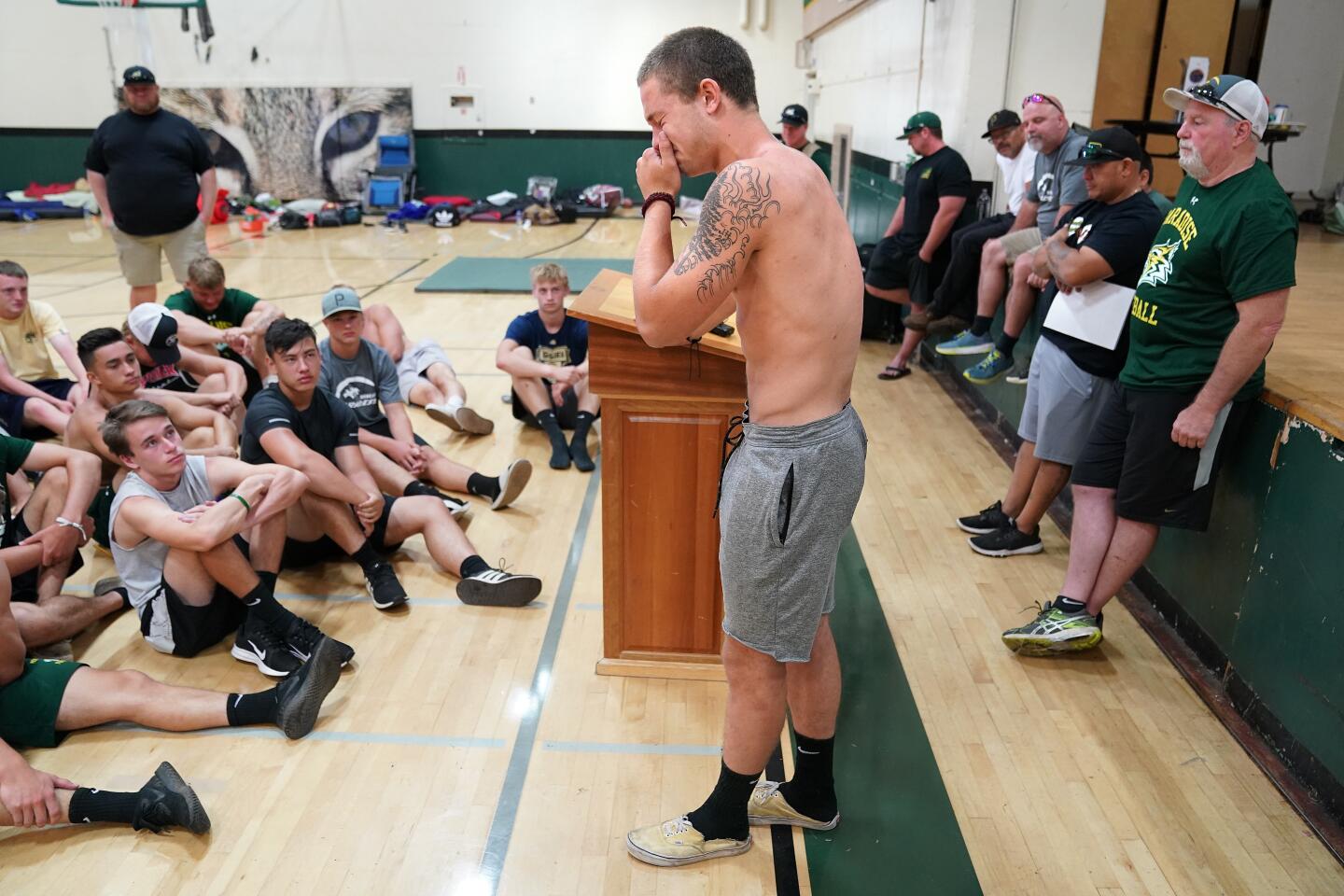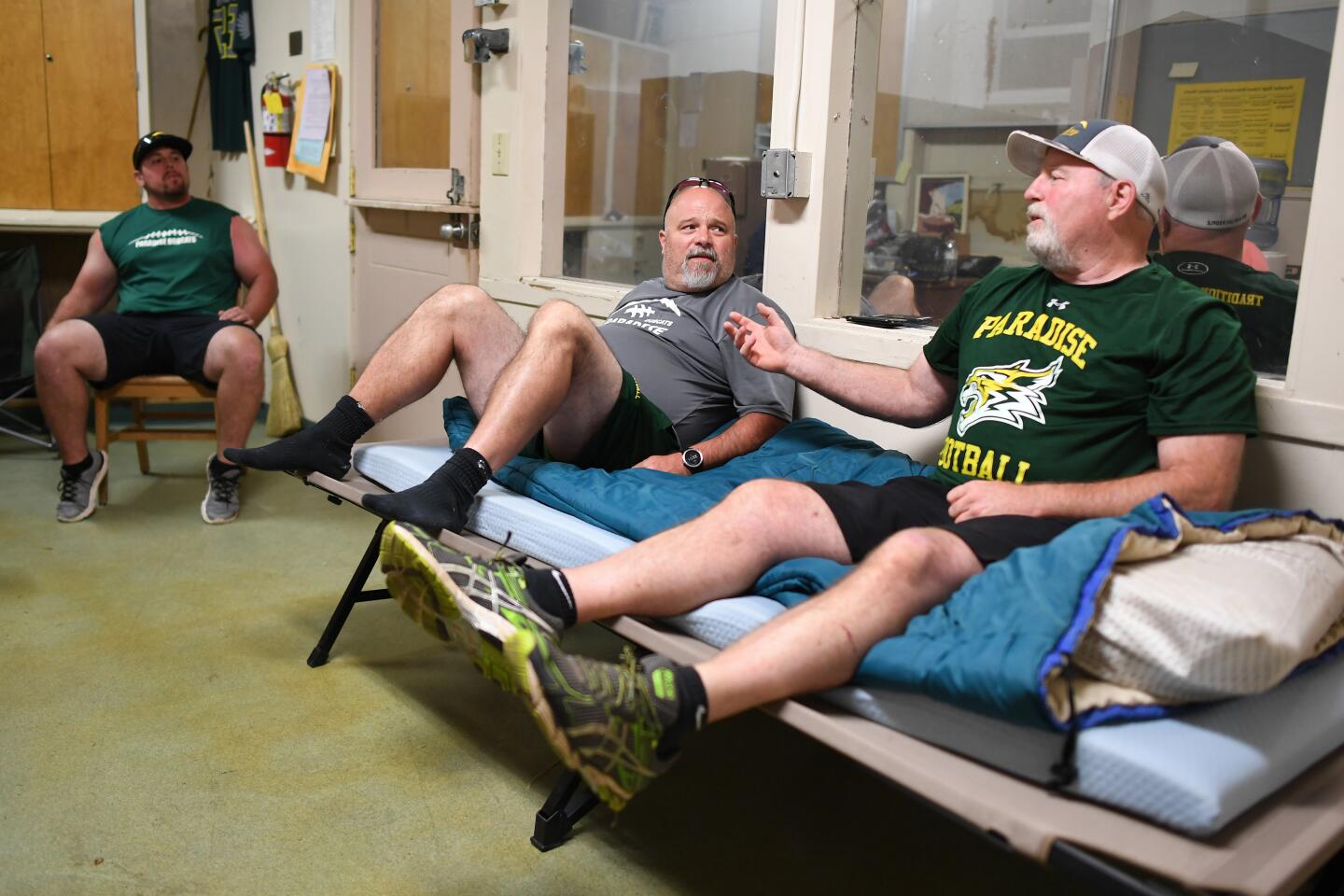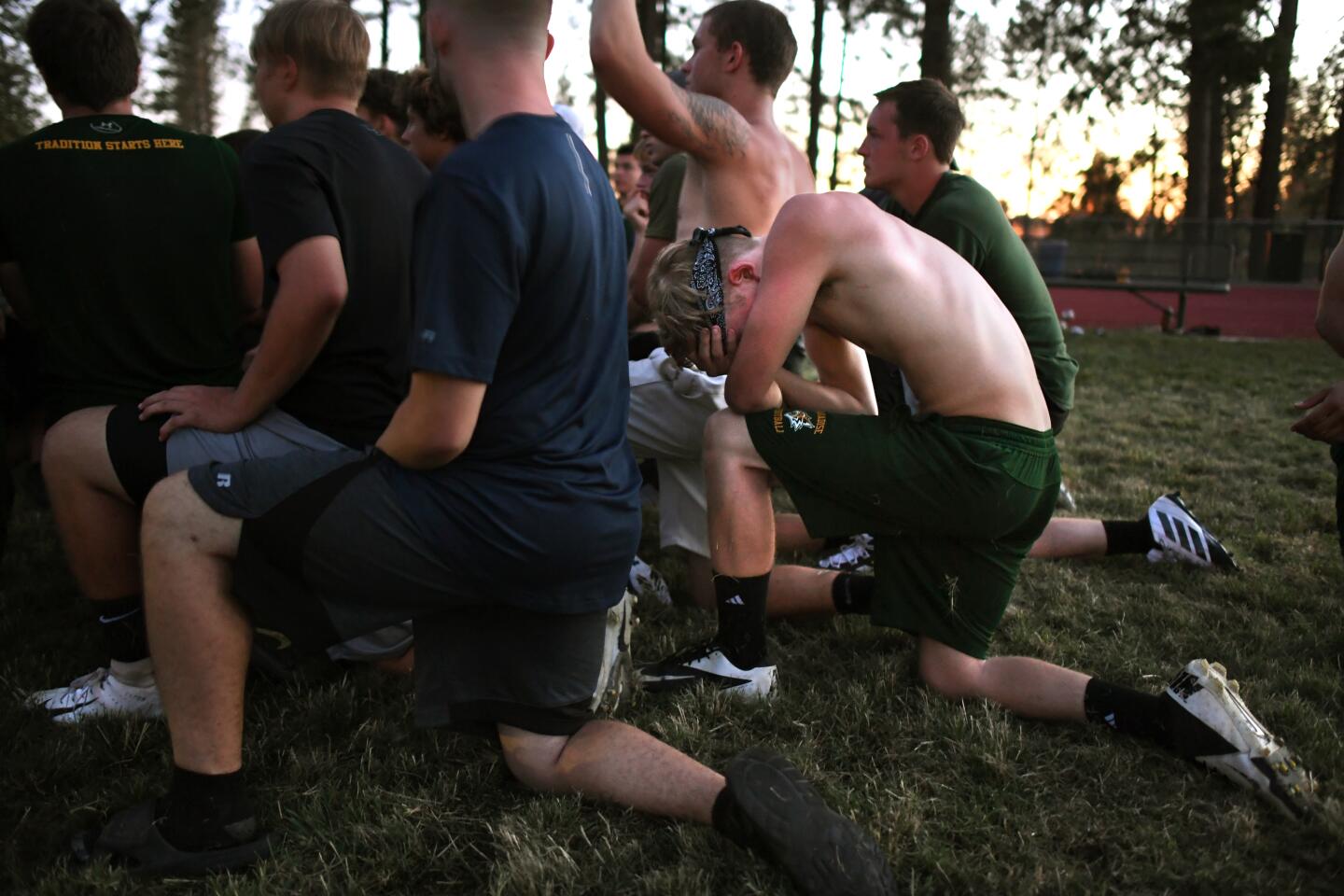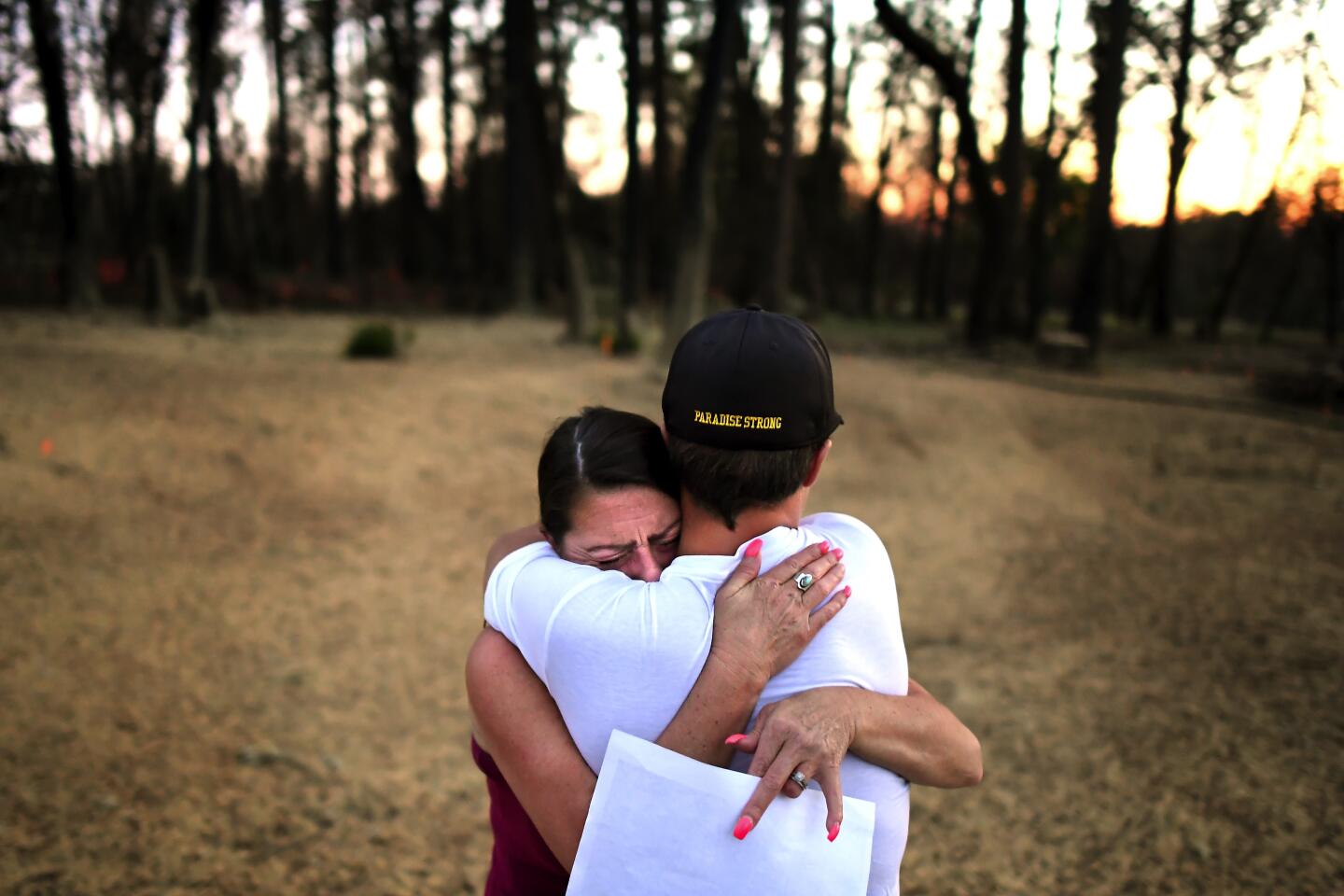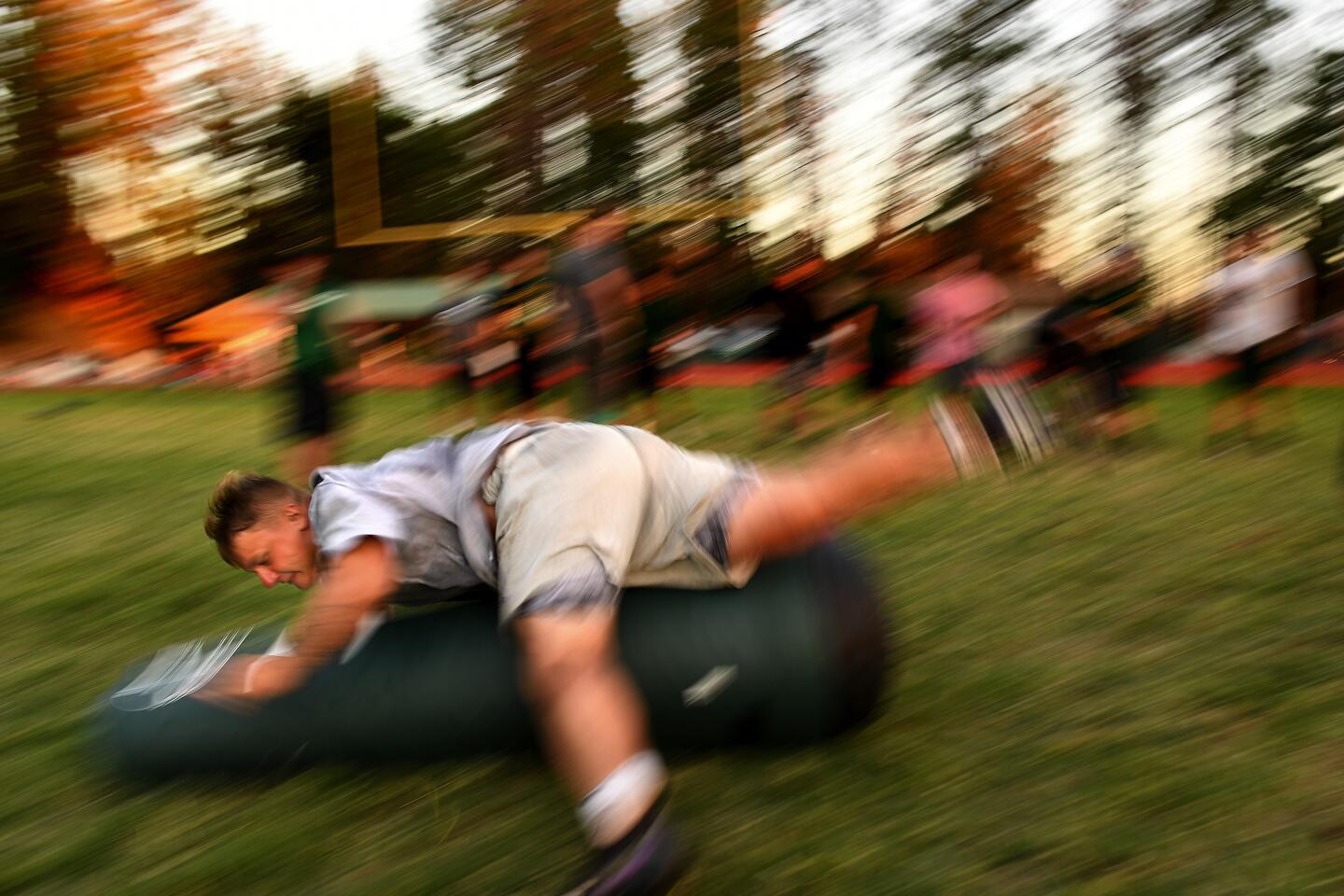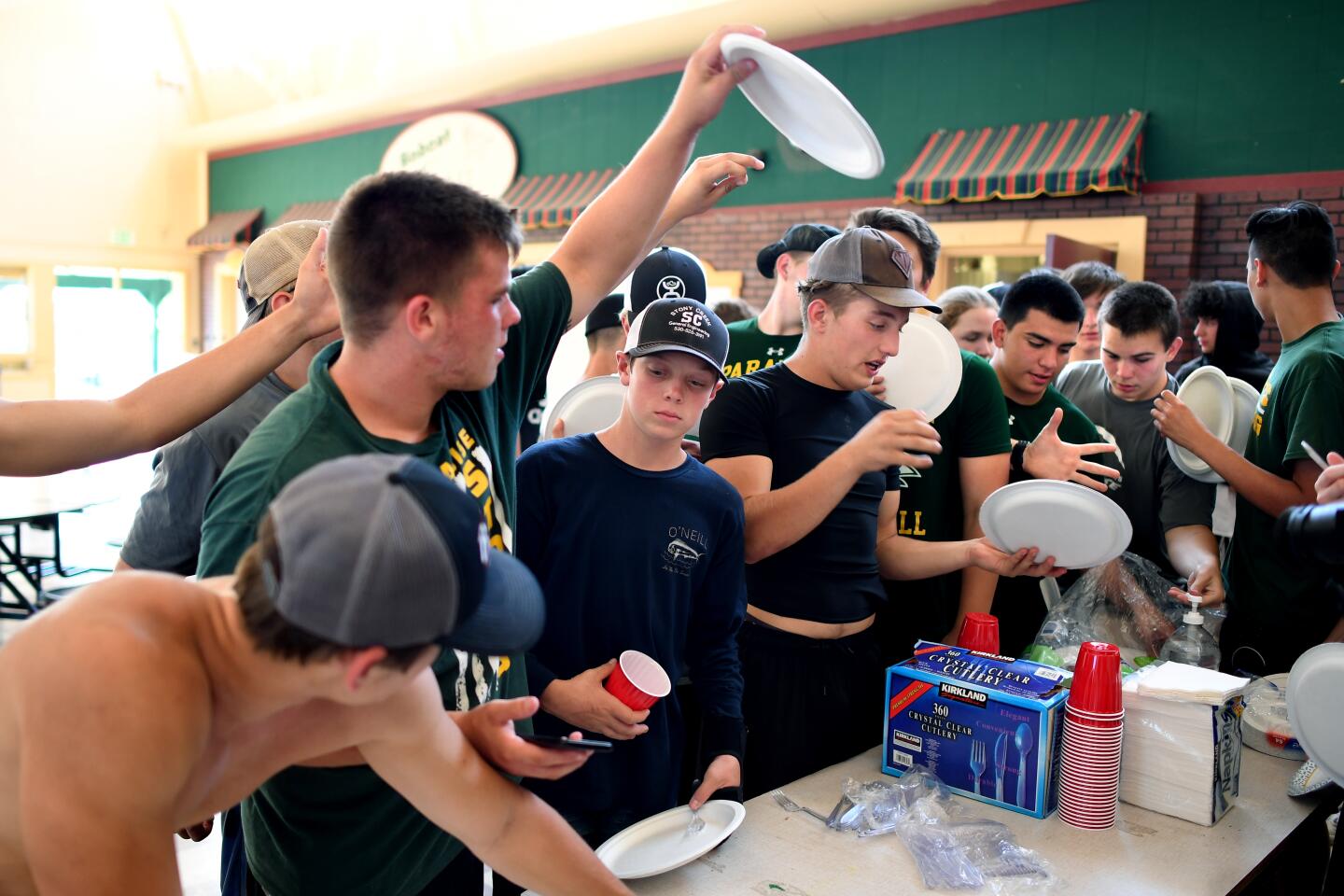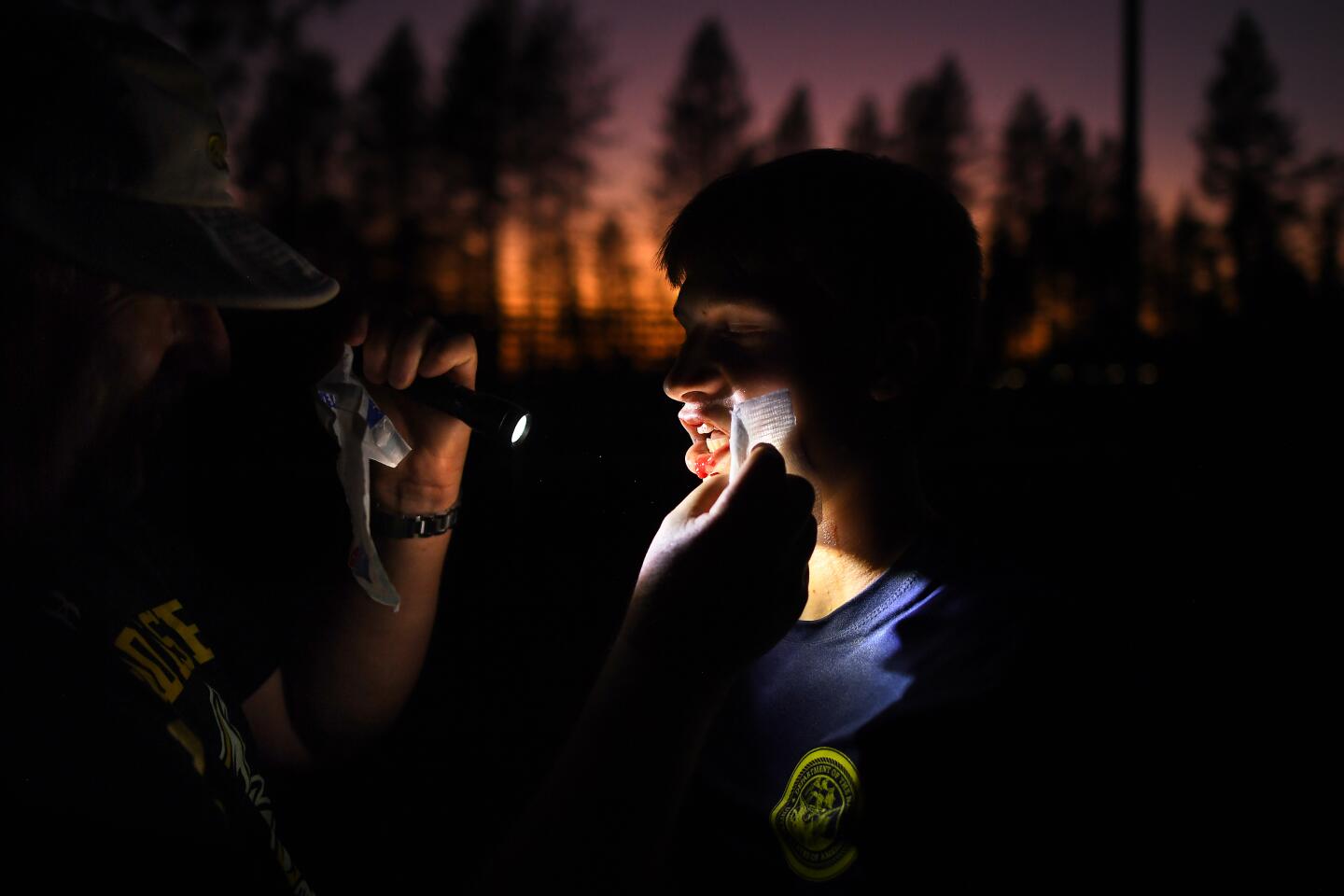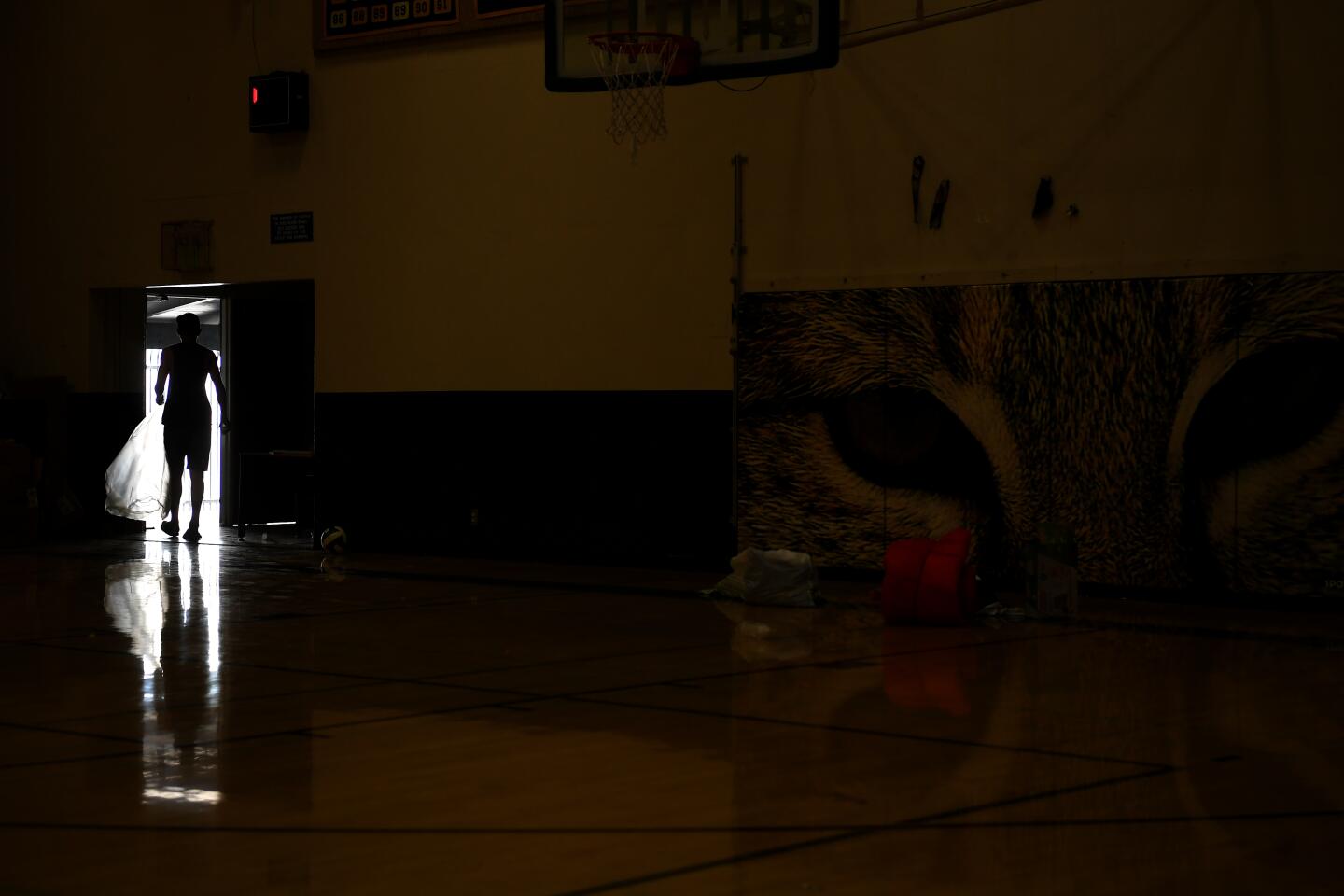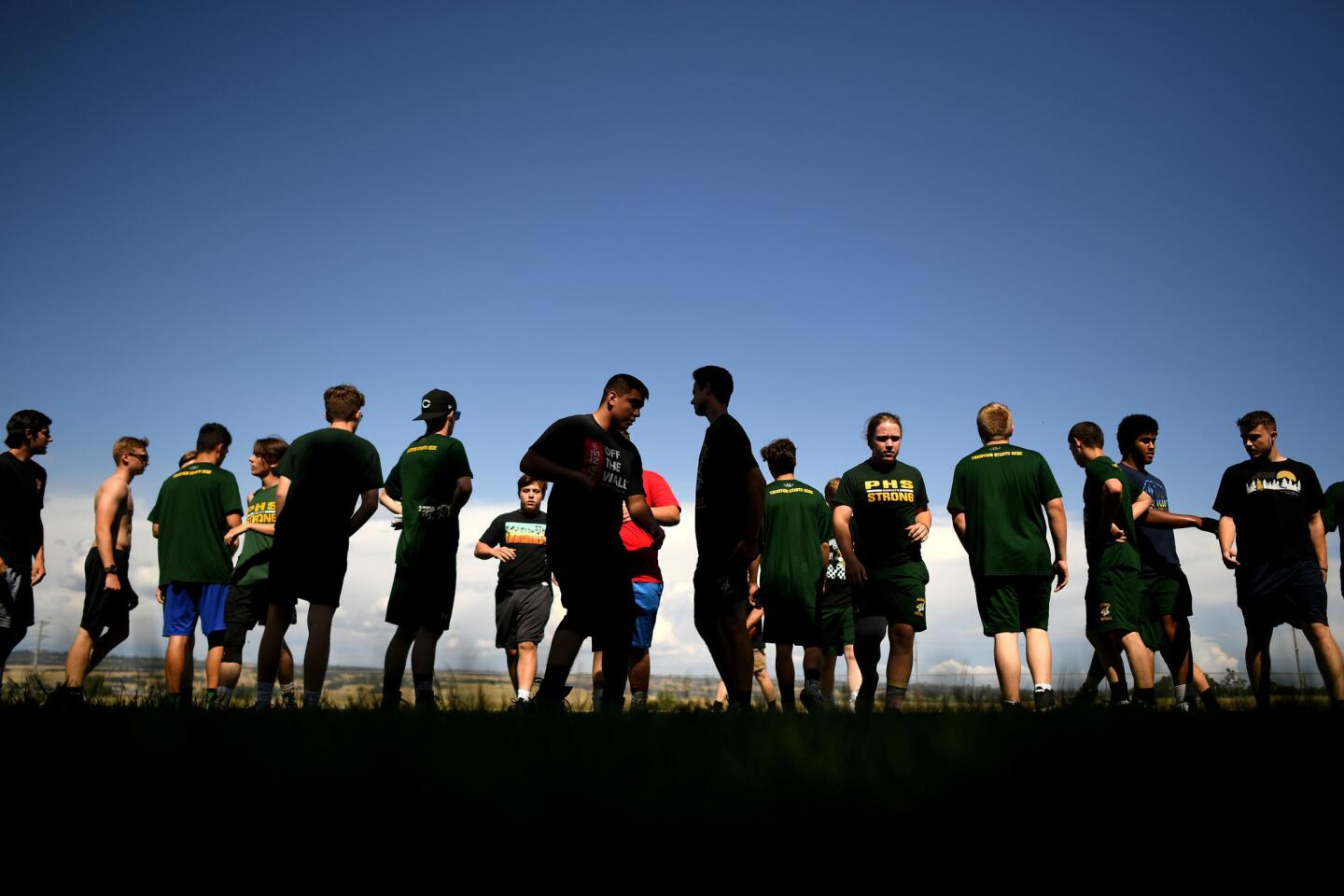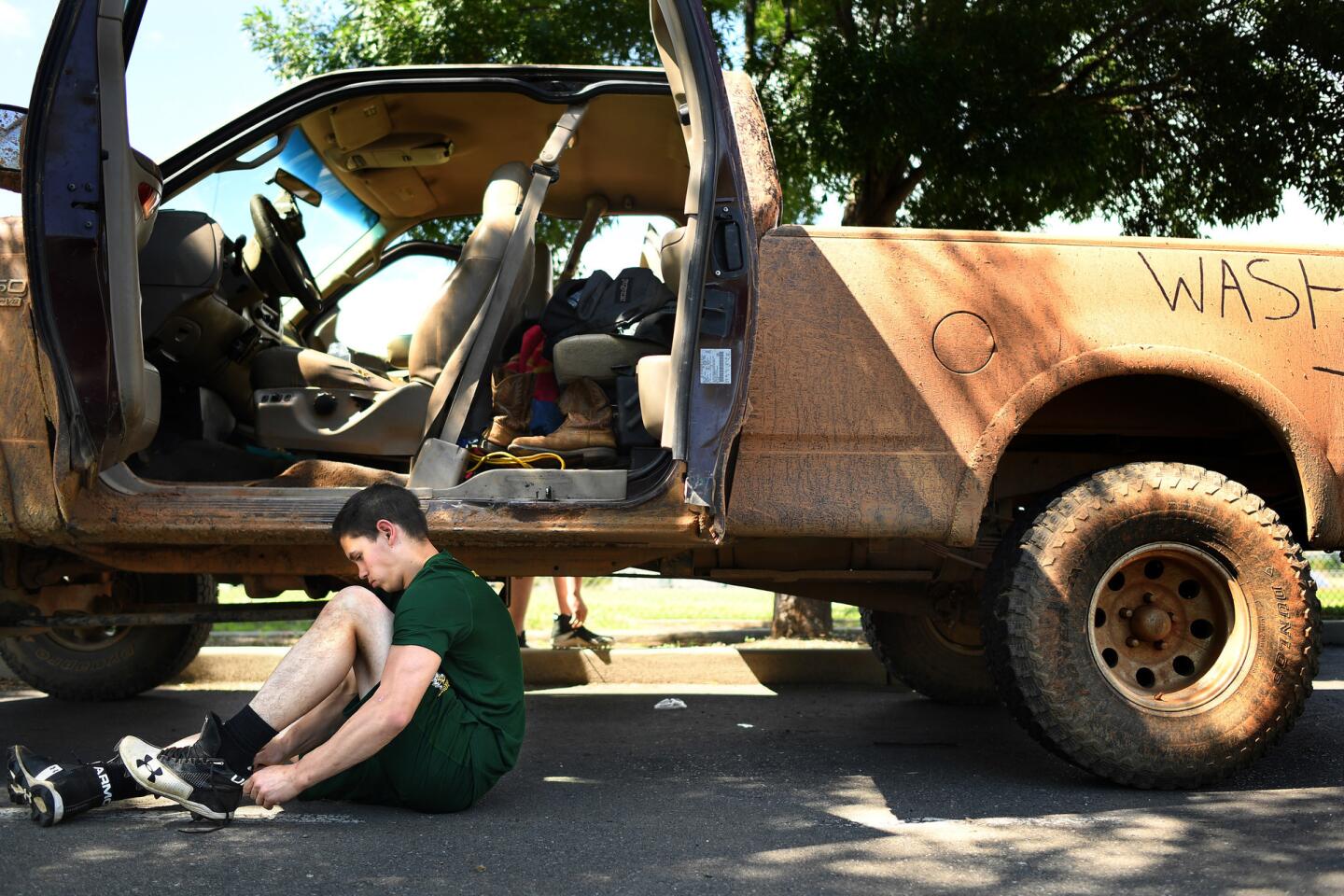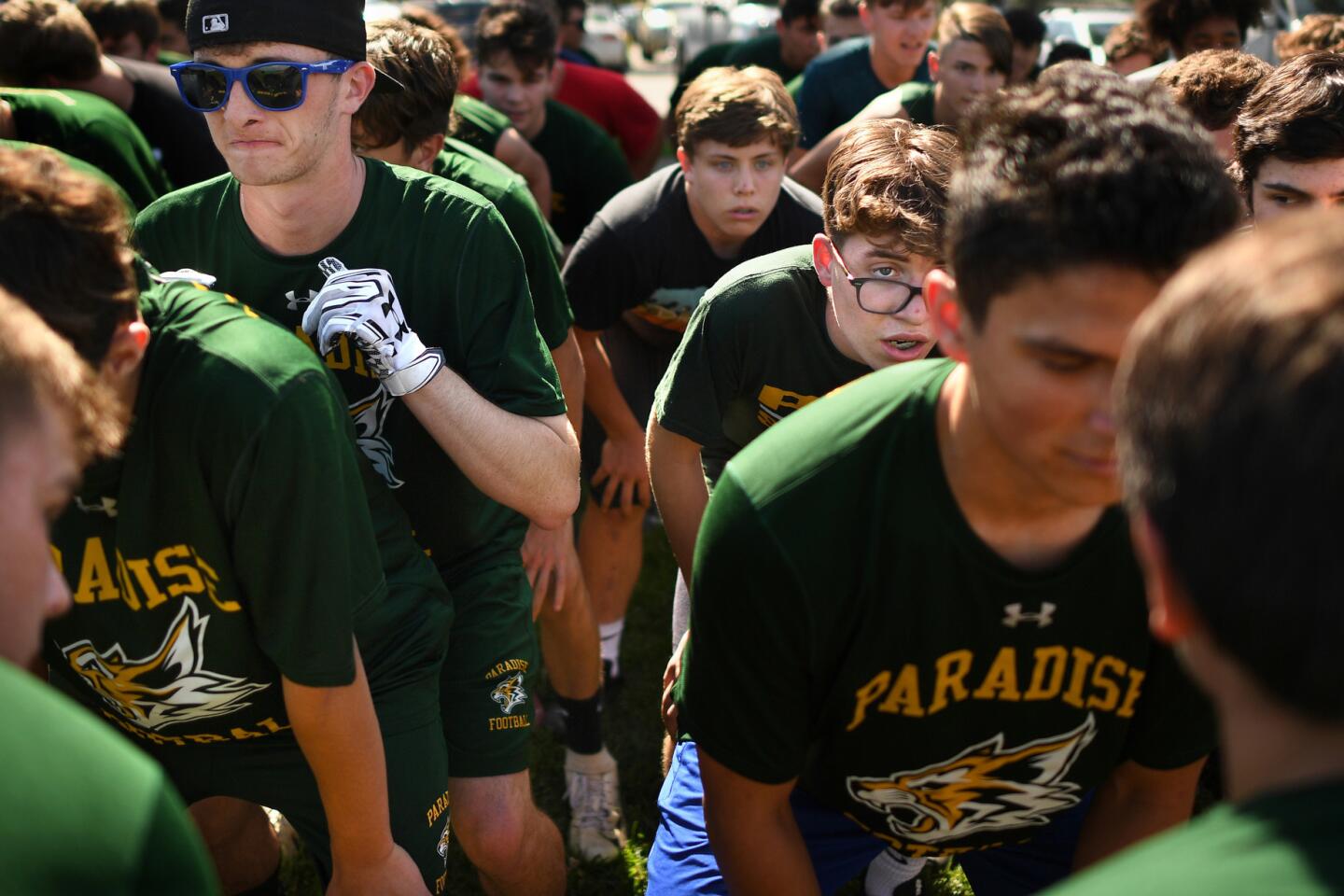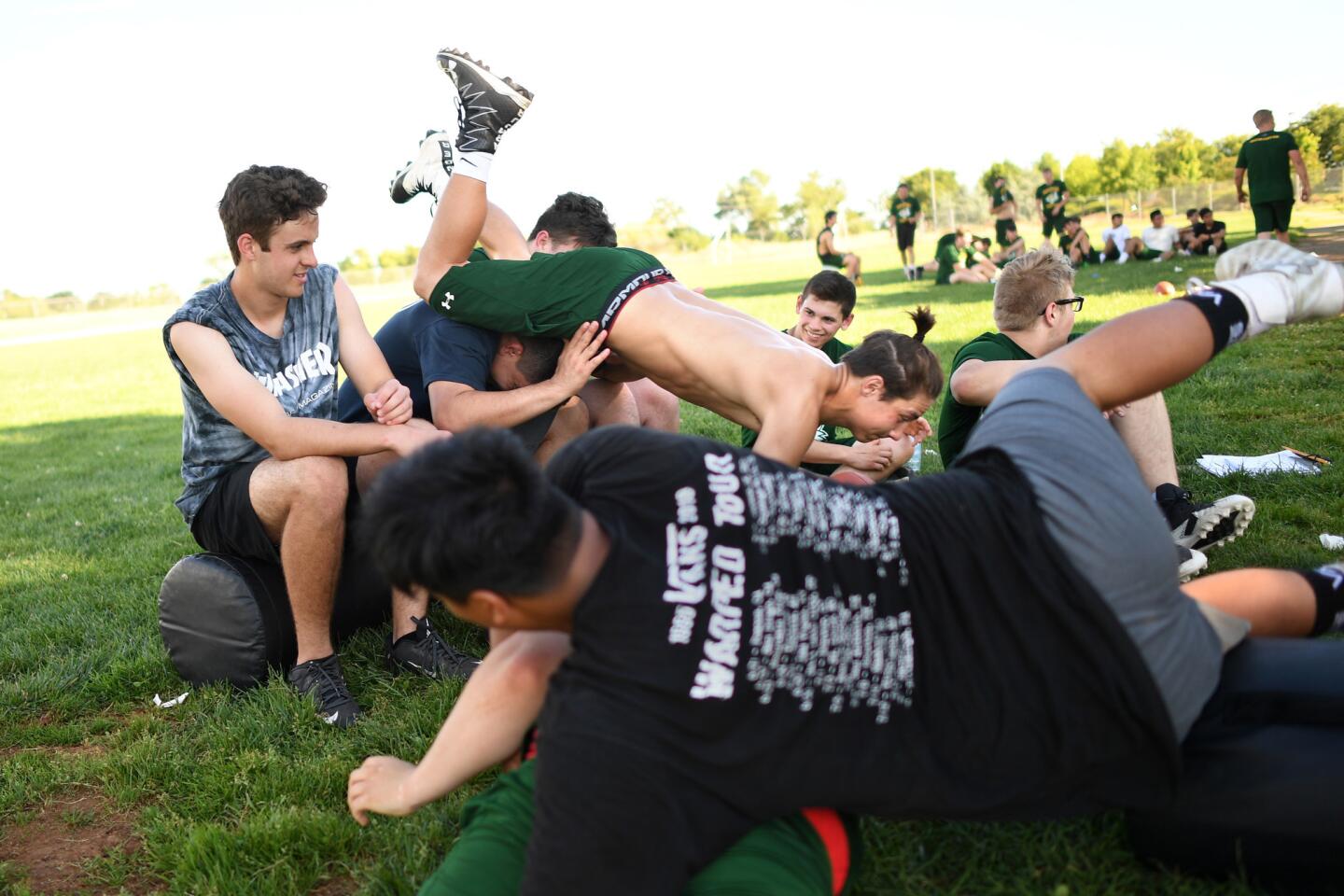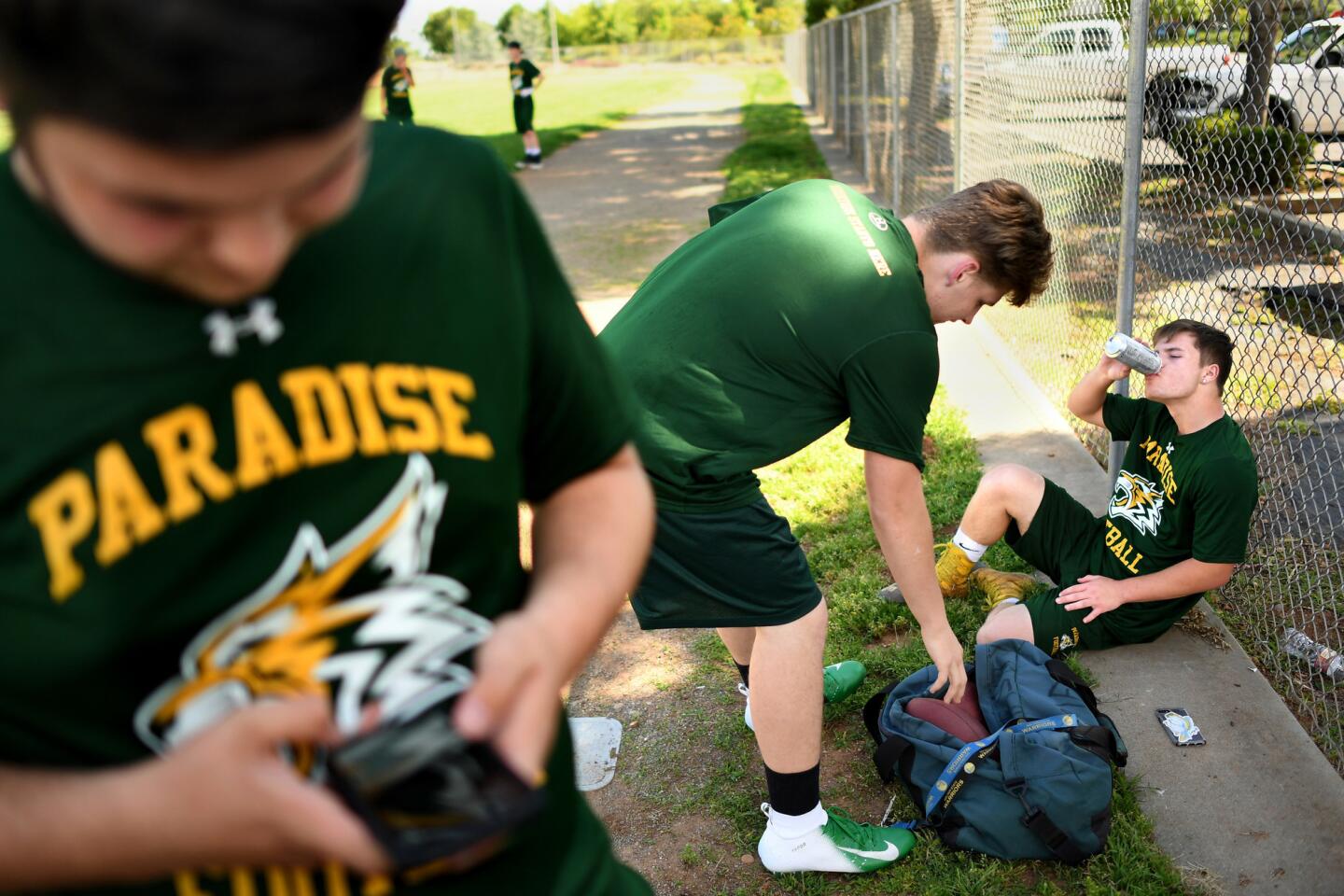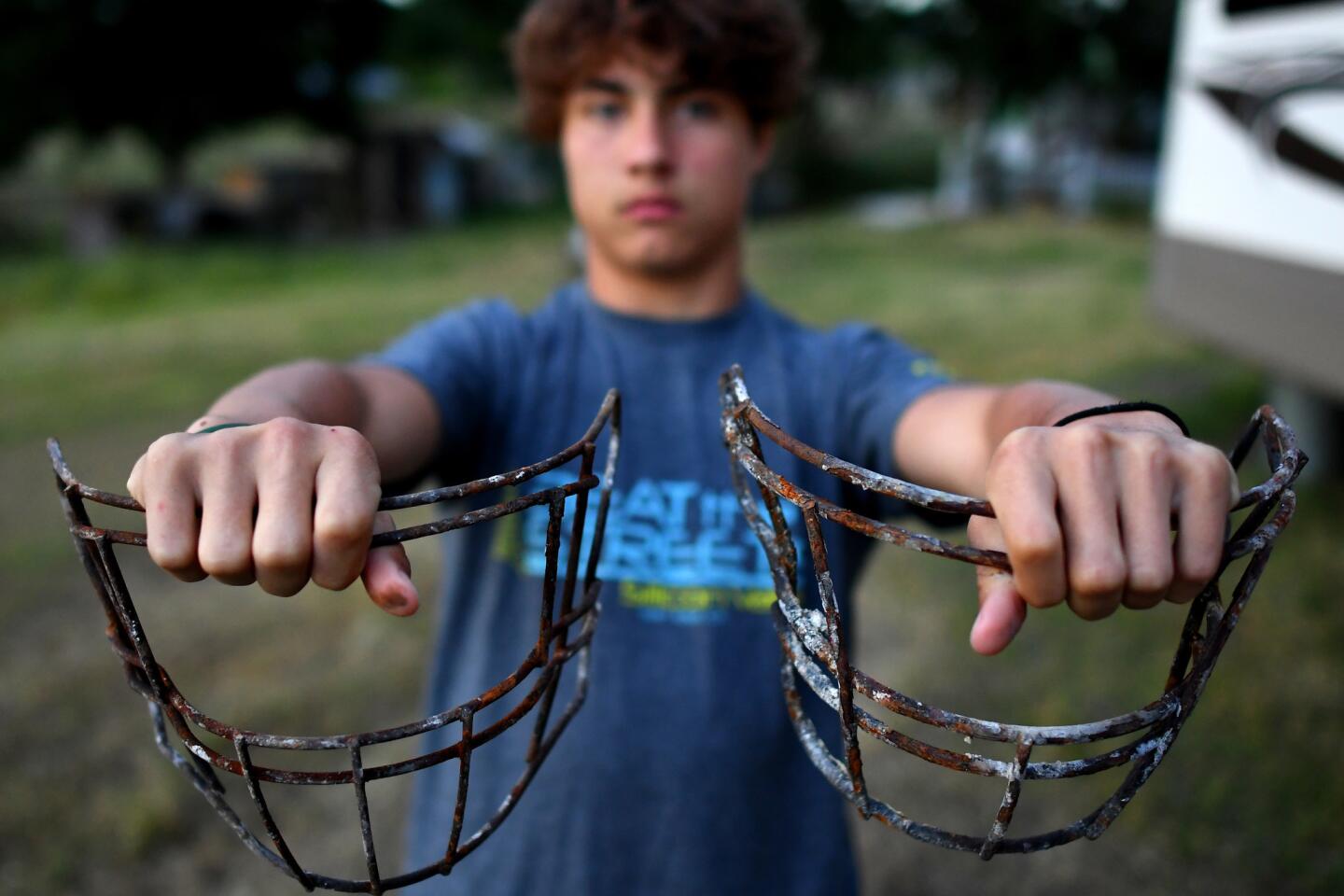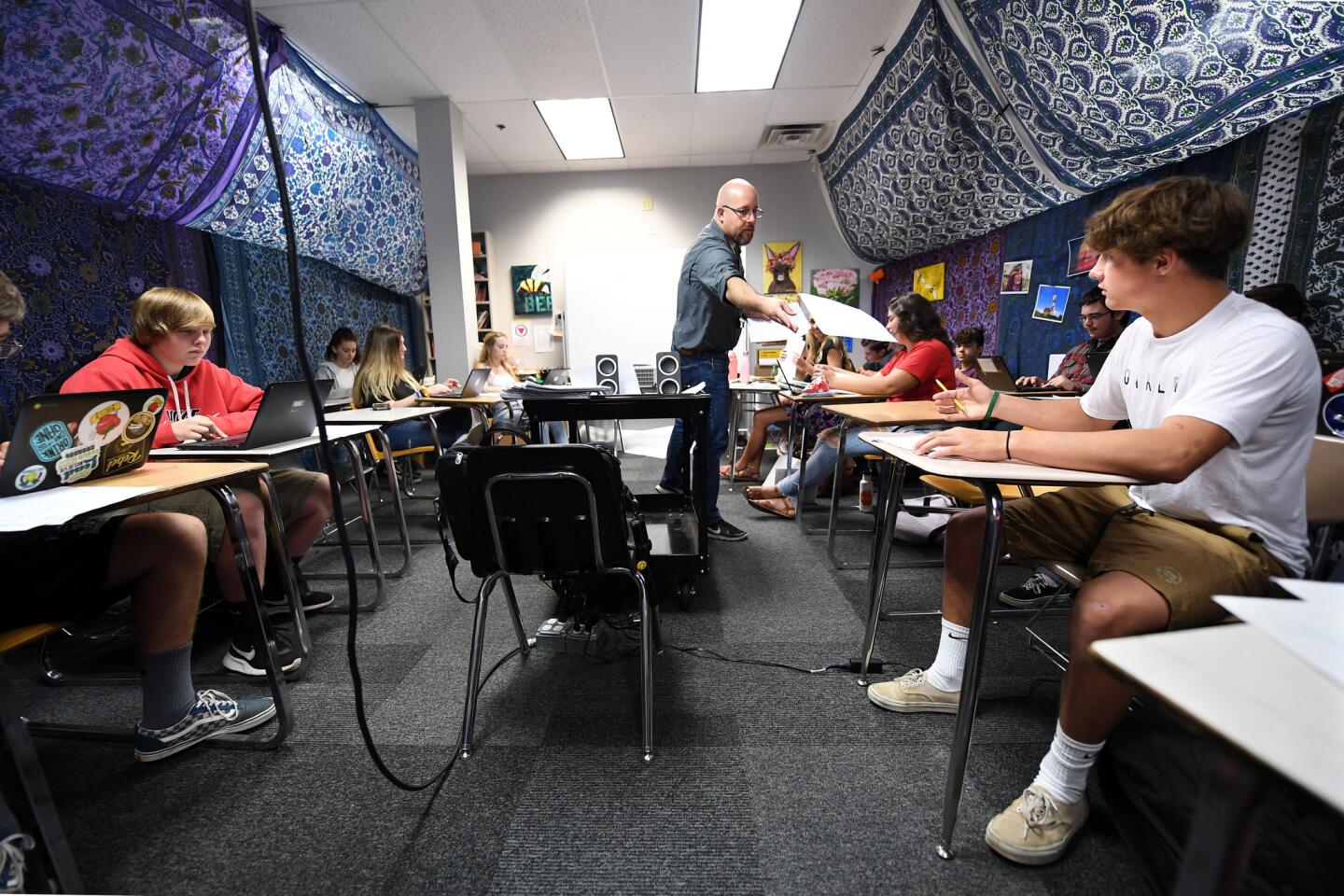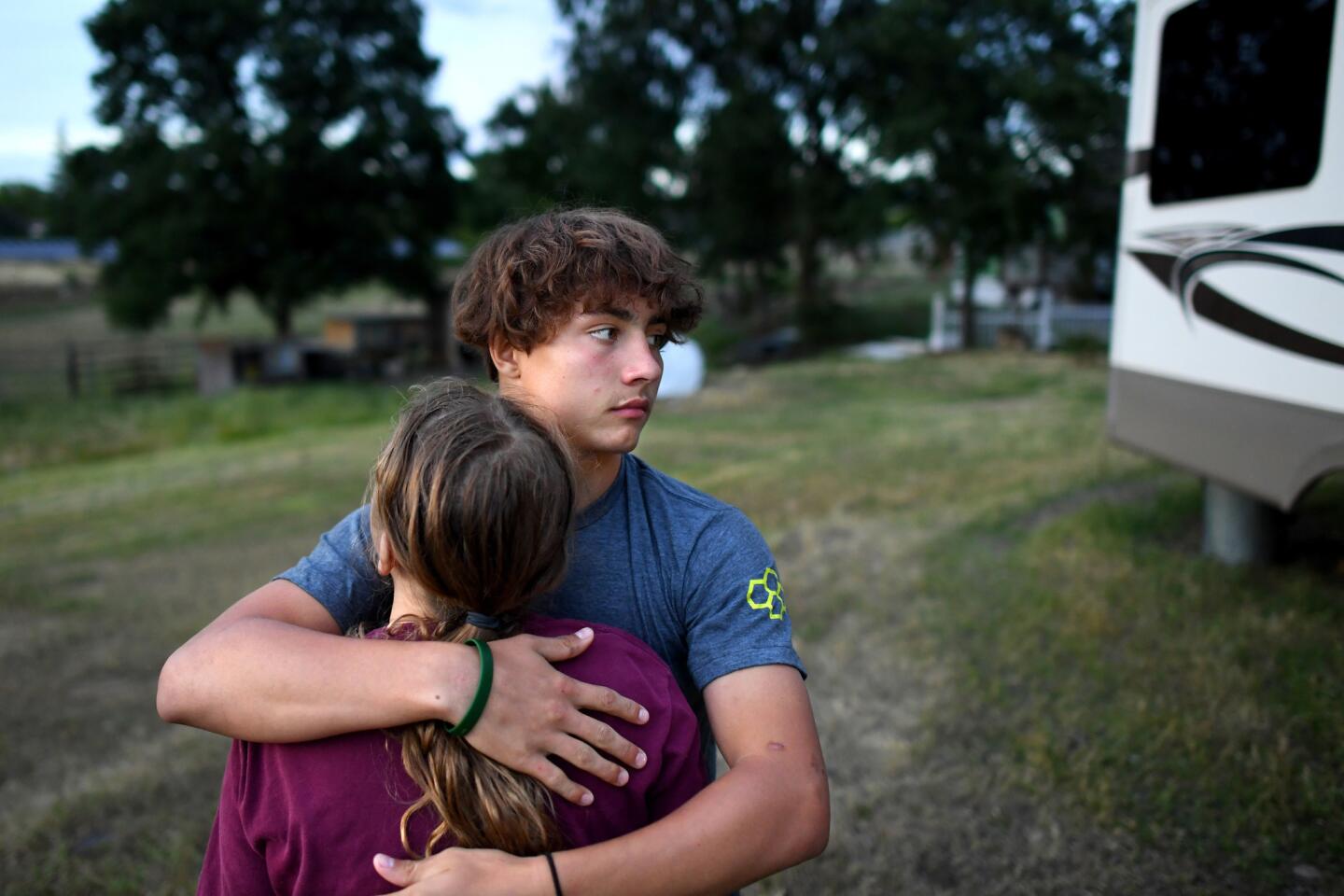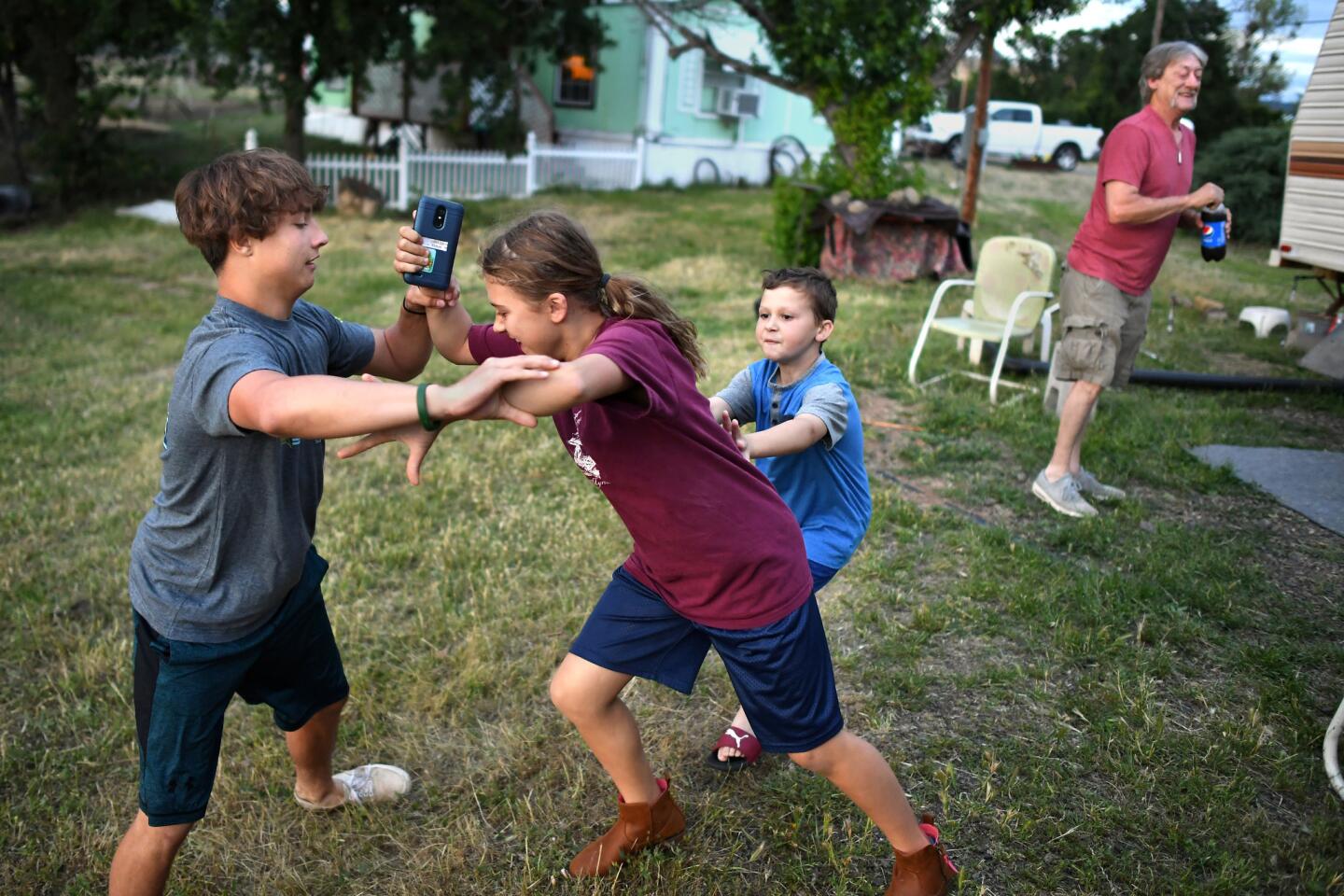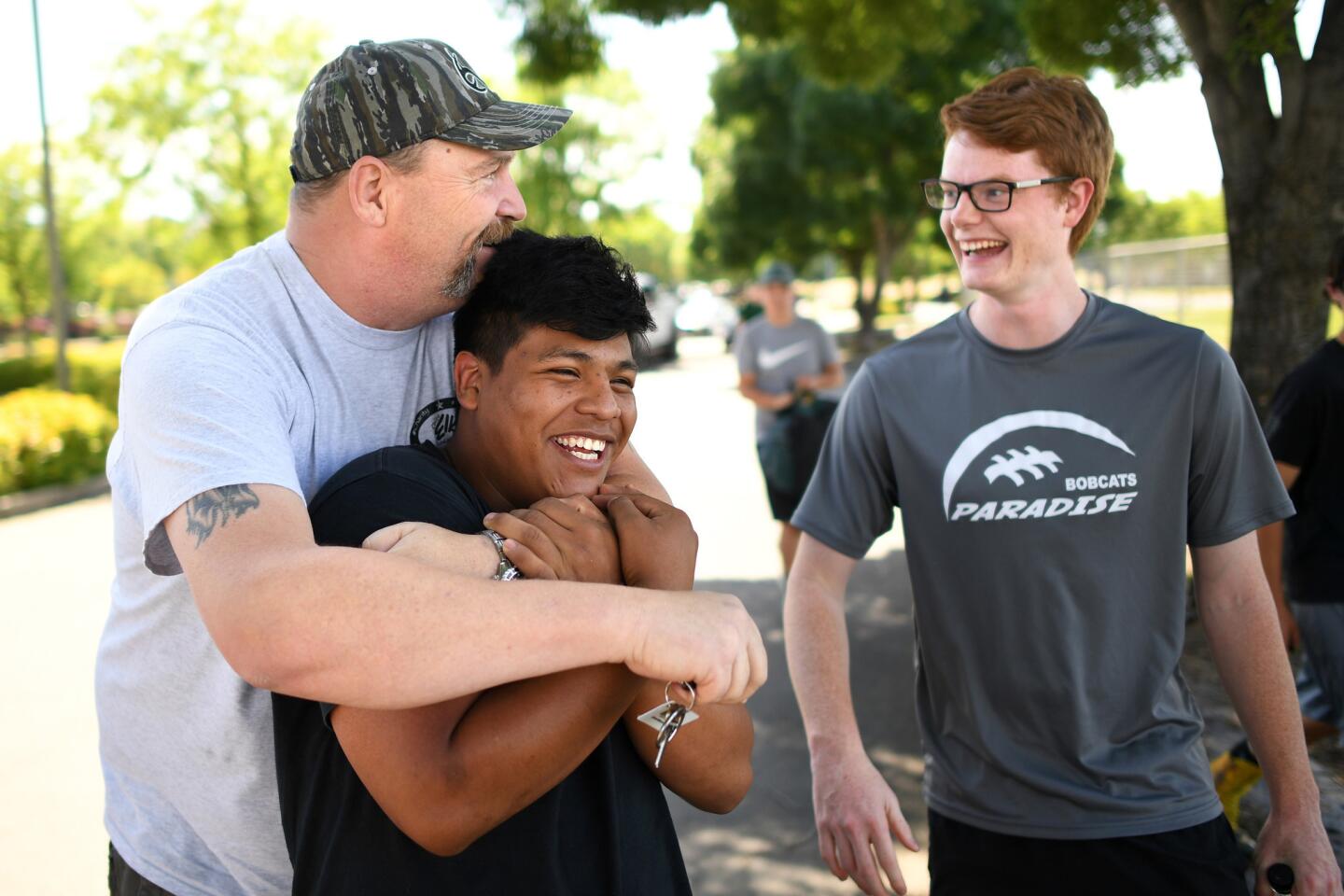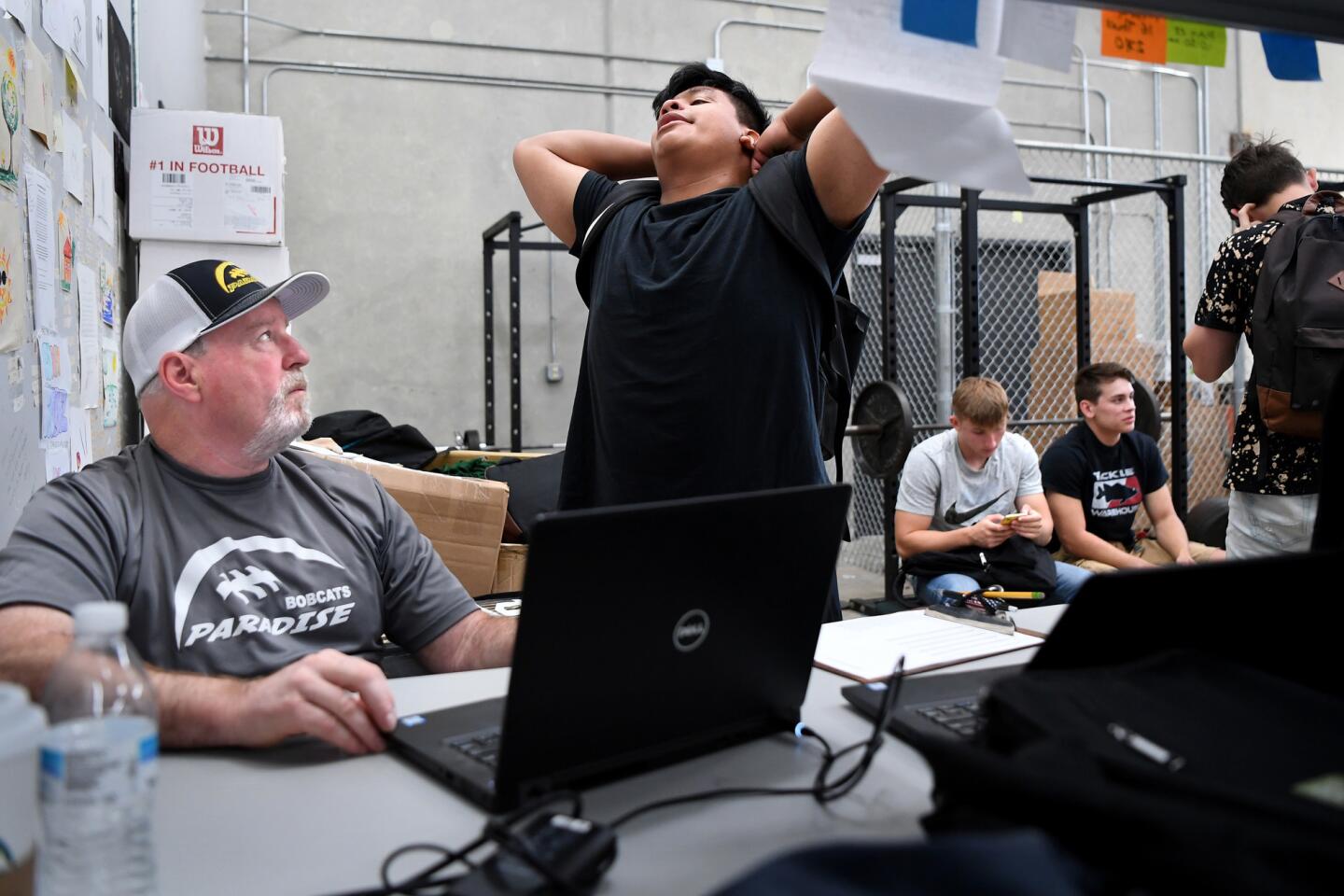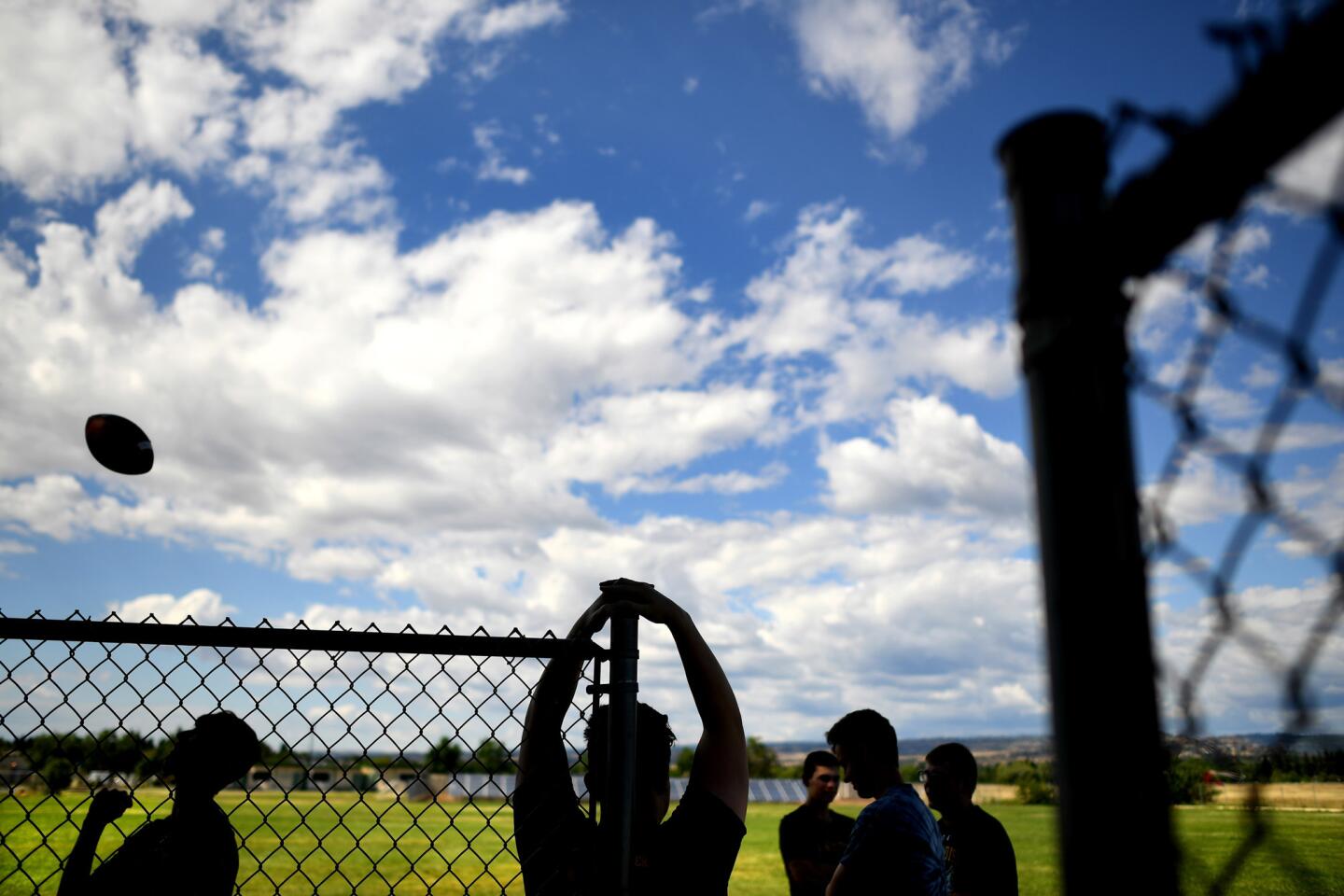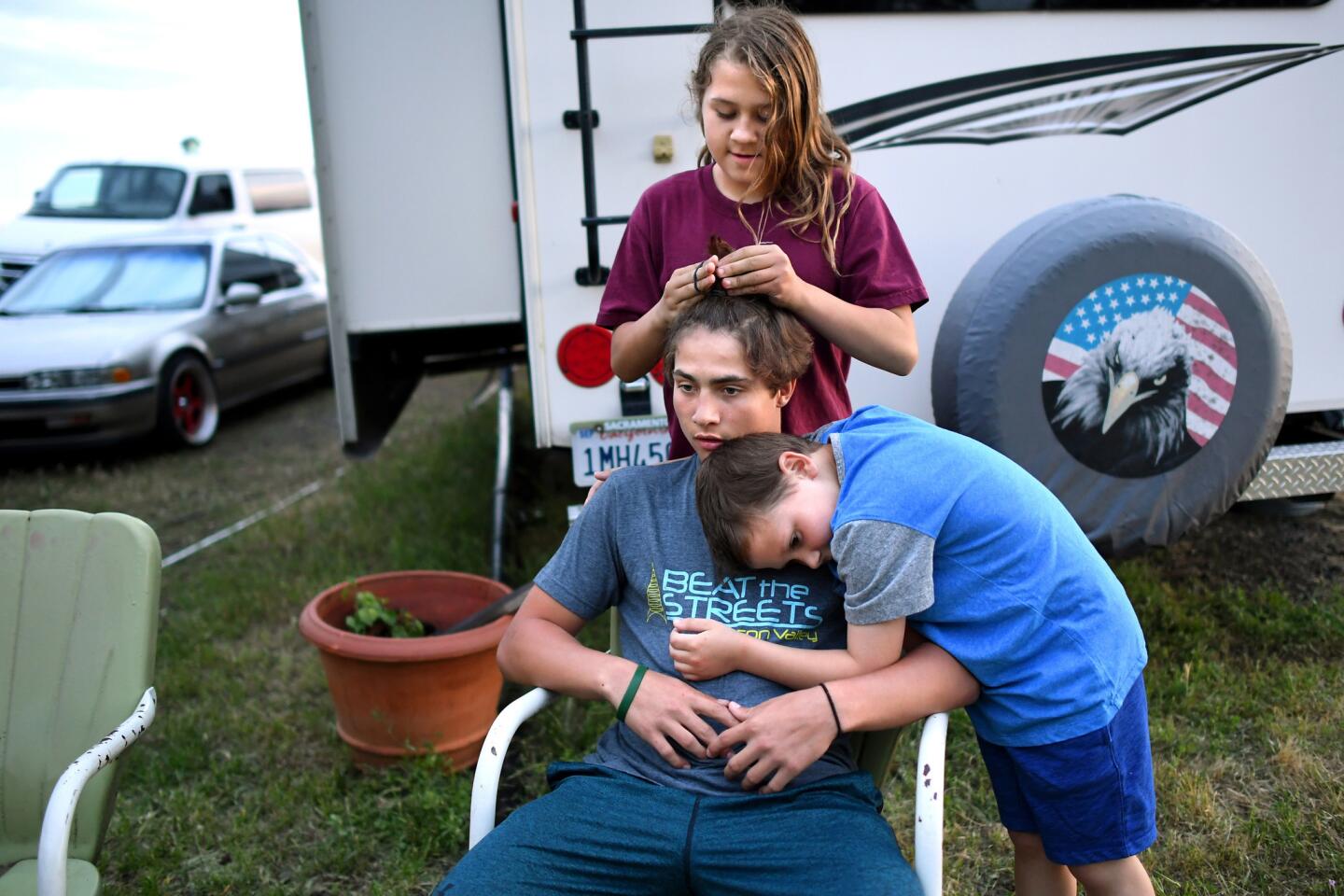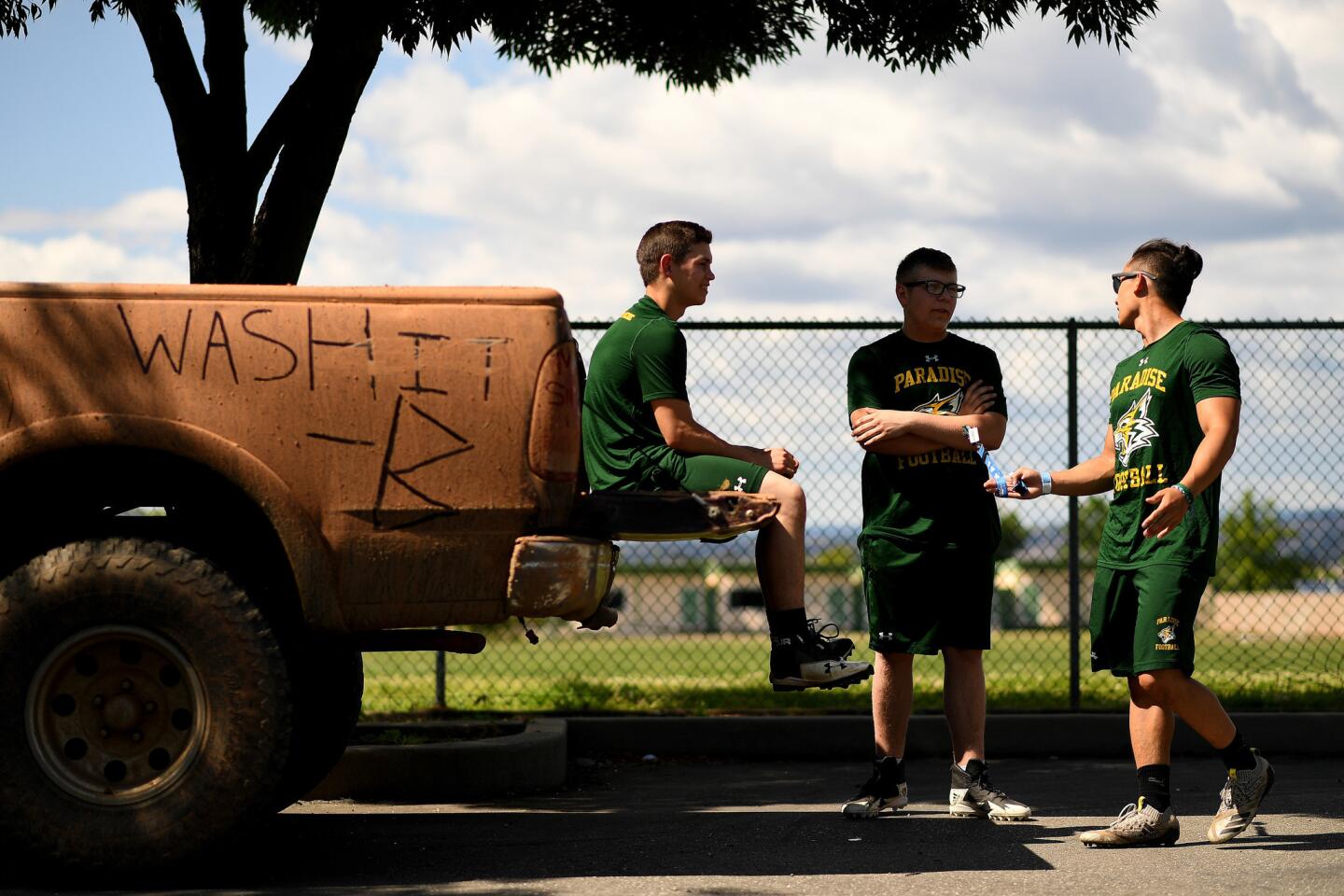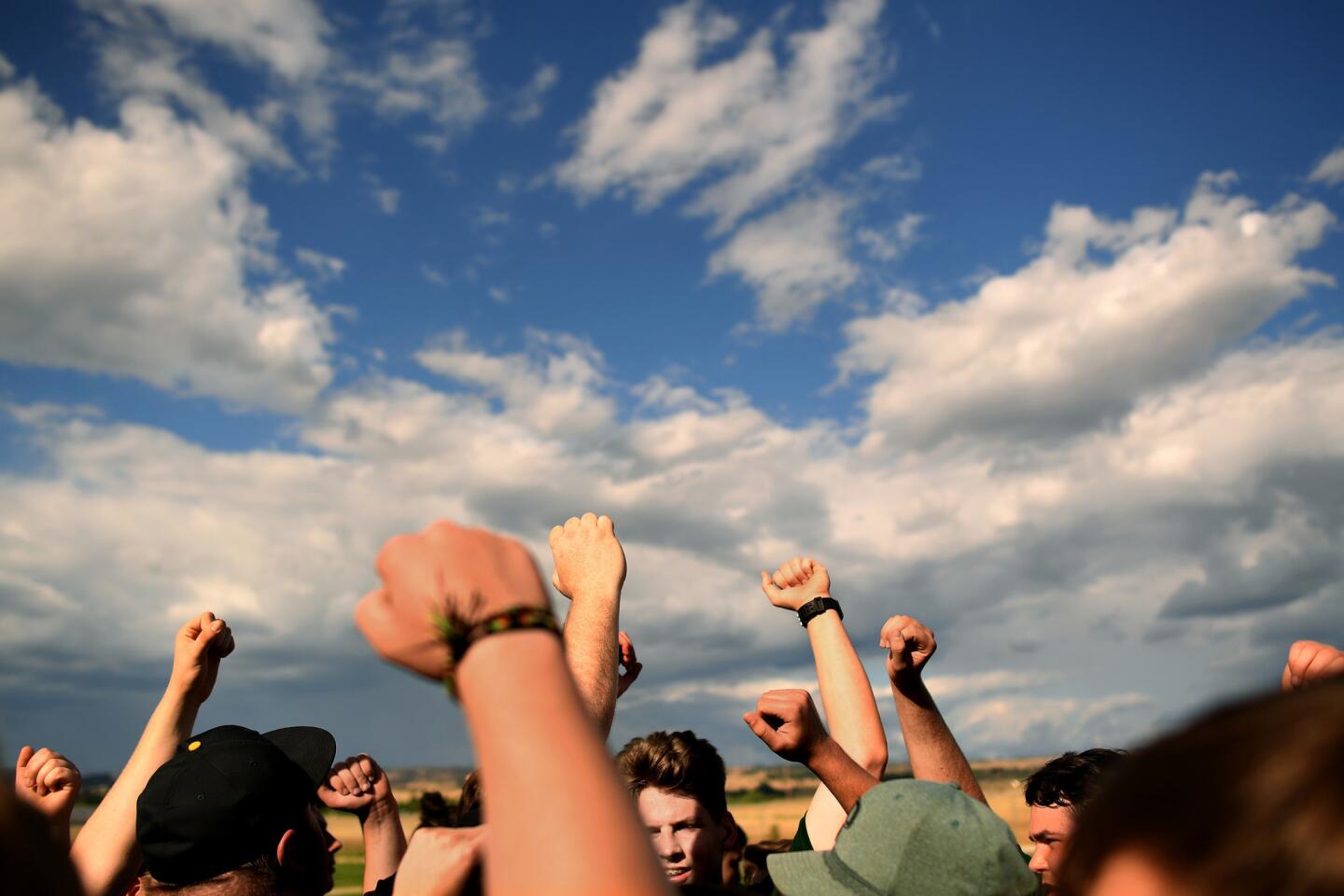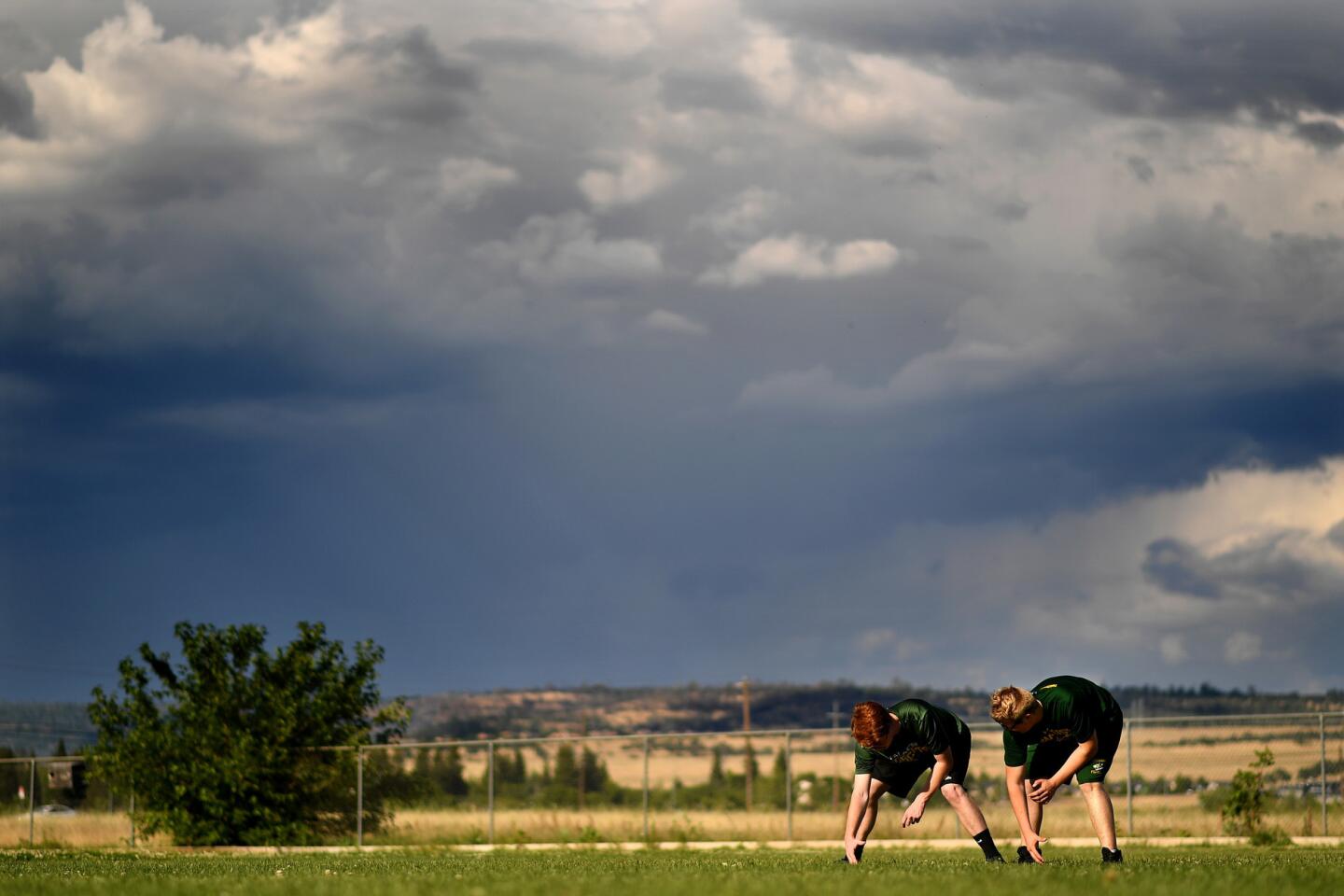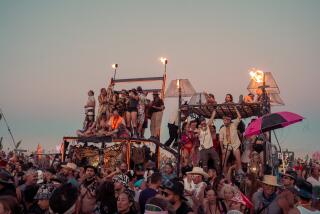The Camp fire destroyed their town. Now the Paradise High football team is trying to save themselves

L.A. Times Today airs Monday through Friday at 7 p.m. and 10 p.m. on Spectrum News 1.Â
Reporting from CHICO, Calif. â The hills that stretch above this grassy pasture were once ablaze, an apocalyptic fire consuming their homes, disrupting their families, melting their childhoods.
Now, six months later, on a makeshift practice field with no yard lines or end zones, the Paradise High football team smolders.
The several dozen teenagers get dressed in the front seats of their dusty trucks and rickety sedans because there is no locker room. Some are wearing second-hand cleats. Others are wearing borrowed shorts.
Their young faces are consumed by yawns because they spent the night sleeping on a couch. Or they spent the last three months sleeping on the floor of a trailer. Or they awoke at 5 a.m. after sleeping on an air mattress 90 minutes away.
They are overwhelmingly tired. They feel like they are homeless. They shuffle their feet across a concrete parking lot and step wearily through an opening in a fence.
But once their toes touch the grass on this soft spring afternoon, they run. Oh, how they run, together in their green Paradise Football T-shirts adorned with the giant face of a bobcat, running from their aborted season, running from disrupted lives, running through their pain.
They bounce off one another with screams. They jump around one another with joy. They huddle together and place their arms on top of one another and erupt in purpose.
âBrothers to the bone!ââ they shout.
In these first days of Paradise Highâs spring practice, their first official workouts since the historically hellish Camp fire on Nov. 8 destroyed their town and caused 86 fatalities, the Bobcats are searching for normal.
âBeing out there on that field is the only thing that feels right,ââ says Taylor Brady, a sophomore receiver.
Though all 104 players in the Bobcats program survived the deadliest fire in California history, 95 of them lost their homes. With the fire leading many to move elsewhere to find housing, the team also lost many of its players to relocation. One running back moved to Oregon. Another one is in Pennsylvania. Another one is in San Diego. A 76-person varsity squad has been whittled to 36. The junior varsity squad will now include freshmen because the freshman team has been eliminated.
The fire occurred on the eve of the teamâs first-round playoff game, so it was the only one of the 15 Paradise High sports teams that also lost its season, suddenly ending an 8-2 campaign that some felt could have ended in a championship.
The players miraculously didnât lose their school, or their beloved Om Wraith Field, but for health and safety reasons they have been banned from playing there until this summer. When they come back, they will find a scoreboard that has been partially melted and stumps of dozens of trees that once shadowed the goal posts. Also gone is the shipping container that housed much of their equipment, its contents reduced to ashes.
âI donât know if anybody outside of our town can understand what weâve gone through,ââ says Spencer Kiefer, a junior linebacker. âJust getting a chance to play football again is amazing.ââ
They lost so much, yet they still have one another, so on this spring afternoon they play through every whistle, smother every blocking bag, climb over one another in every scrum, awash in the joy of being together again and the hope of an autumn reborn.
âI lined up and looked to my left and saw my buddy Ray, I looked to my right and saw my buddy Nate, and I finally felt at home,ââ says Riley Hopper, a freshman center. âIt made me forget, and it reminded me, all at the same time.ââ
âNow that weâve had this catastrophe, I canât walk away, I canât just leave the kids like this.â
— Paradise coach Rick Prinz
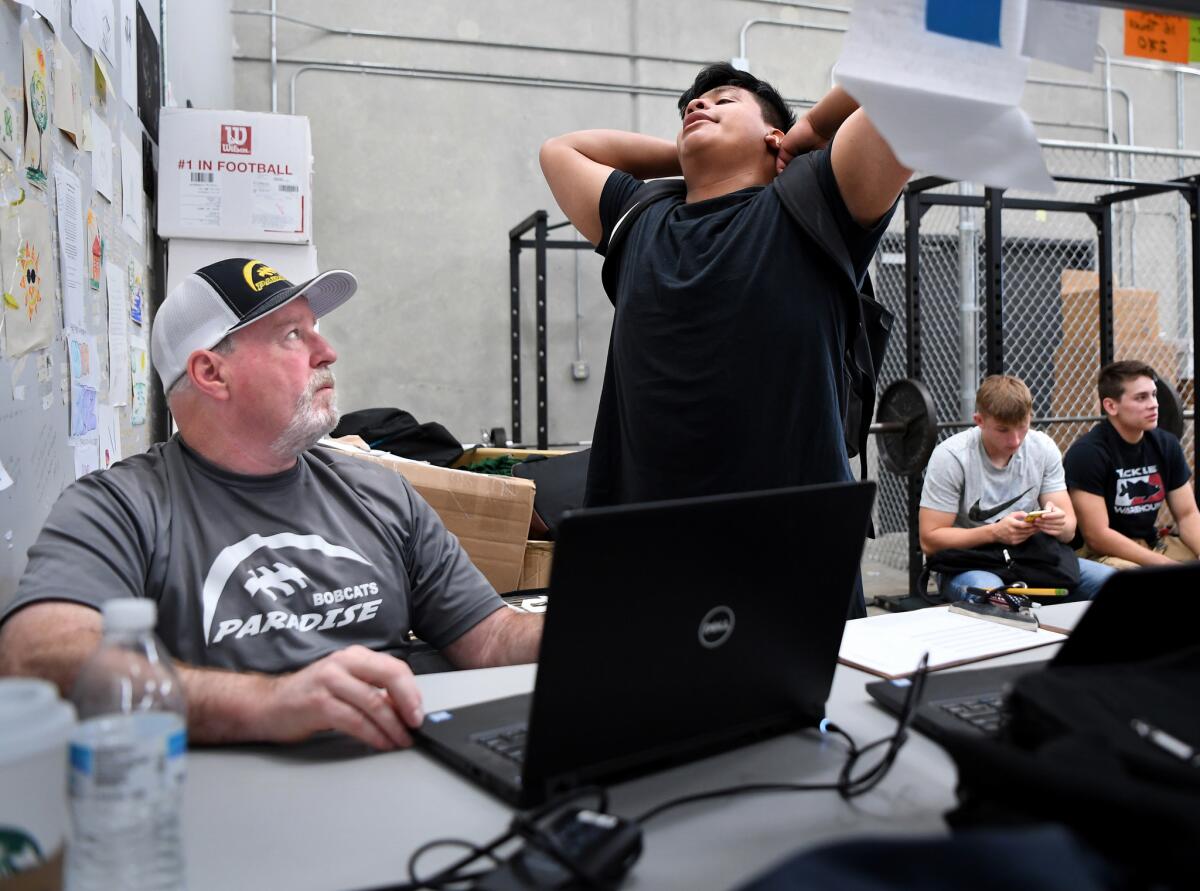
They lost so much, but they still have their coach, the venerable Rick Prinz, a 60-year-old with a quiet stare and a white goatee. He has 30 years invested in the school, 20 as the head coach, and last season was going to be his finale. He was going to retire, but that plan literally went up in flames. The fire was still burning when he decided to stick around because thatâs what leaders do.
âNow that weâve had this catastrophe, I canât walk away, I canât just leave the kids like this,ââ Prinz says. âI feel like I have a responsibility to help our school and the football program get back on its feet, whatever thatâs going to take, Iâve got to try to do it.ââ
They lost so much, but they still have an upcoming season awaiting them, although their smaller size â enrollment is expected to drop from about 1,000 to 350 â forced them to leave their division and play an entirely new and odd 10-game independent schedule cobbled together by athletic director Anne Stearns.
They will play at least three schools that are twice their size. They will play a game 2 ½ hours north at Mount Shasta High â even though they have no idea how they will get there because Paradise also lost most of its bus drivers to post-fire relocation. Stearns had to make dozens of phone calls and play the sympathy card dozens of times just to find those 10 teams, and yes, she is considering acquiring a special license so she can drive the bus herself.
âNobody wanted to play us because they were in a no-win situation,ââ Stearns says. âIf you lose to Paradise, it doesnât look good for you to lose to a team that lost half of its student body. If you beat Paradise, then you beat the team from the town that burned down.ââ
They have one another, their coach, their schedule and, above all, their mission. It is a mission fashioned from the moment those boys were chased down the hill on that nightmarish Thursday morning in November, some sitting in smoke-surrounded cars weeping in fear, one of them even stuck alone outside in a parking lot crying into the phone to his parents that he was going to die.
They all have different escape stories, they all have different tales of landing in trailers or hotels or on floors, but their mission is the same, one you can hear in spring shouts filled with equal parts joy and revenge.
âThat fire picked a fight with the town of Paradise,ââ says Greg Kiefer, father of Spencer. âWhen these kids come back, theyâre going to smoke people.ââ
The first day of the official comeback of the Paradise High football team was briefly delayed by a tiny glitch.
They didnât have a football.
Shortly after school resumed in January in an old Facebook warehouse at the Chico Municipal Airport, Prinz summoned the players to an adjacent weed-choked field to begin the comeback, and he realized just how much had been lost.
âI looked around and thought, wait a minuteâŚââ Prinz remembers. âMy first speech to the team was, âDoes anybody have a football?ââ
They lucked out. Danny Bettencourt, a junior quarterback, had one rolling around in the trunk of his car. His father bought it for him after the fire. It was quickly retrieved and brought to a relieved team. On a field of dirt and gravel and dog poop, with the players wearing jeans and stepping around potholes, winter workouts began.
âItâs actually pretty shocking that weâre still able to keep going,ââ Bettencourt says.
Considering Paradise is such a tradition-deep football town, it might have been more shocking if they had quit. On Friday nights when the Bobcats play at home, the Sierra foothills village virtually shuts down, several thousand of the formerly 25,000 residents filling Om Wraith Field.
âA big part of the soul of the town is football,ââ Stearns says.
The players enter the stadium by walking down through the packed stands. They have traditionally been accompanied by the school marching bandâs rendition of a song that now has new meaning â Johnny Cashâs âGodâs Gonna Cut You Down.ââ The concession stand sells a Prinz Dog. The Bobcats usually win.
âA big part of the soul of the town is football.â
— Paradise athletic director Anne Stearns
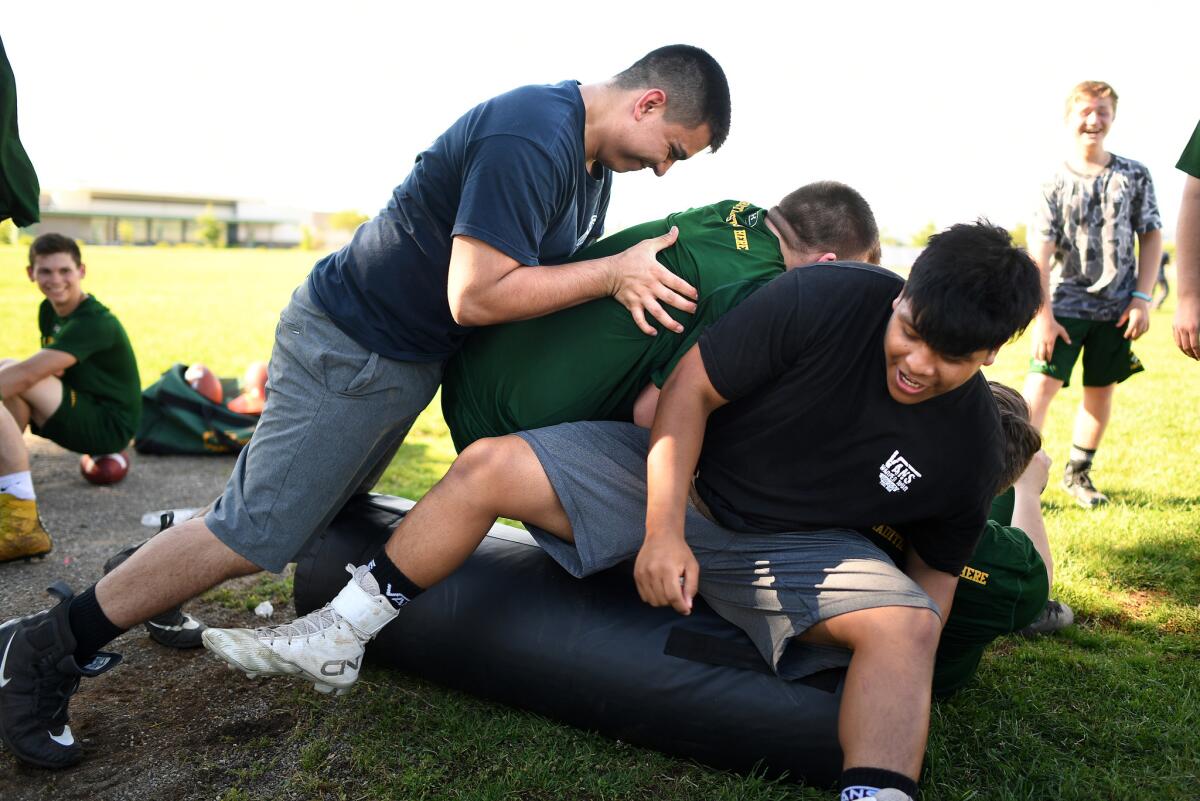
âItâs like something out of a movie,ââ Prinz says.
The star is the high school varsity team, which builds off the strength of an enduring youth football program that runs the same system as the varsity and turns 8-year-old kids into green-and-gold Bobcats.
âThe football program is that mountain,ââ Greg Kiefer said. âOther teams and their fans all call us a bunch of hillbillies, but those hillbillies whip their ass.ââ
It is Prinz who has created that attitude, leading the Bobcats to 18 playoff appearances in his 20 years with 10 league titles, 10 sectional appearances, six sectional titles, a 166-54 overall record and various coaching awards.
He is such a beloved character, everyone refers to him as âPrinz.ââ He runs an old-fashioned Wing-T rushing offense. He lives by old-fashioned sayings like the one that adorns the back of the football teamâs caps â âWe Just Hit People.ââ Yet he is so approachable, the wall above his desk in the middle of the schoolâs makeshift weight room is filled with thank-you notes and drawings from students.
âI canât imagine trying to do this without him,ââ Stearns says of Prinz. âHe has so much respect in the community, a lot of kids are staying here just because of him.â
The folks from town will tell you Prinz is the perfect person to lead this team through fire, although on that Thursday morning of Nov. 8, he had his doubts.
One moment he was texting members of his 8-2 team to remind them that practice was still scheduled despite the threat of a fire. The next moment he was escaping down the hill toward Chico like the rest of them.
But unlike most of the residents who were driving through the flames on a gridlocked six-hour nightmare of a trip that usually takes 15 minutes, Prinz was actually pushing a car.
It was a 1947 red Ford truck that represented his lasting memory of his father. He couldnât stand to see it destroyed, but it was running out of gas, so he pushed it several miles downhill before driving the rest of the way.
âIt was dark as midnight, explosions all around, I just focused on getting out,ââ he remembers. âMy dad left me that truck, and I wasnât going to let it burn.ââ
Among members of the football team, Prinzâs journey wasnât even the most harrowing.
Spencer Kiefer, just three months after earning his driverâs license, was attempting to drive out in his Ford truck with his dog Gracie when he became stranded with about 150 others in a Paradise parking lot. He spent several hours shuttling between buildings while calling his parents, including his father, Greg, who was pulling the family trailer and couldnât reach him. He was calling them in tears, telling them good-bye.
âI told my parents I didnât think I was going to make it,ââ Spencer remembers.
By nightfall Spencer was finally able to join a caravan and drive down the hill. After escaping danger, he was comforted by a familiar sight in the back of his truck.
âI still had my football pads,ââ he remembers. âI was ready for our playoff game.ââ
There were initial thoughts that the playoffs could be salvaged. Red Bluff, Paradiseâs first-round opponent, generously agreed to forfeit the next dayâs game, which would allow the Bobcats a week to prepare for the second round. Stearns was eventually able to secure fields and equipment. The 8-2 team had a chance to save its championship hopes.
But two days after the fire, Prinz heard the pain in his playersâ voices, saw the confusion in his coachesâ lives, and ordered the season canceled.
âThereâs a little regret about it, Iâm still emotional over it,ââ he says now, his eyes welling with tears. âBut most of my kids had lost everything. Most of my coaches had lost everything. My team didnât even know where they were going to sleep, and Iâm going to ask them to practice? I couldnât do it.ââ
âWe never had our chance, we never had our shot â it really hurt.â
— Senior captain Trevor Curtis
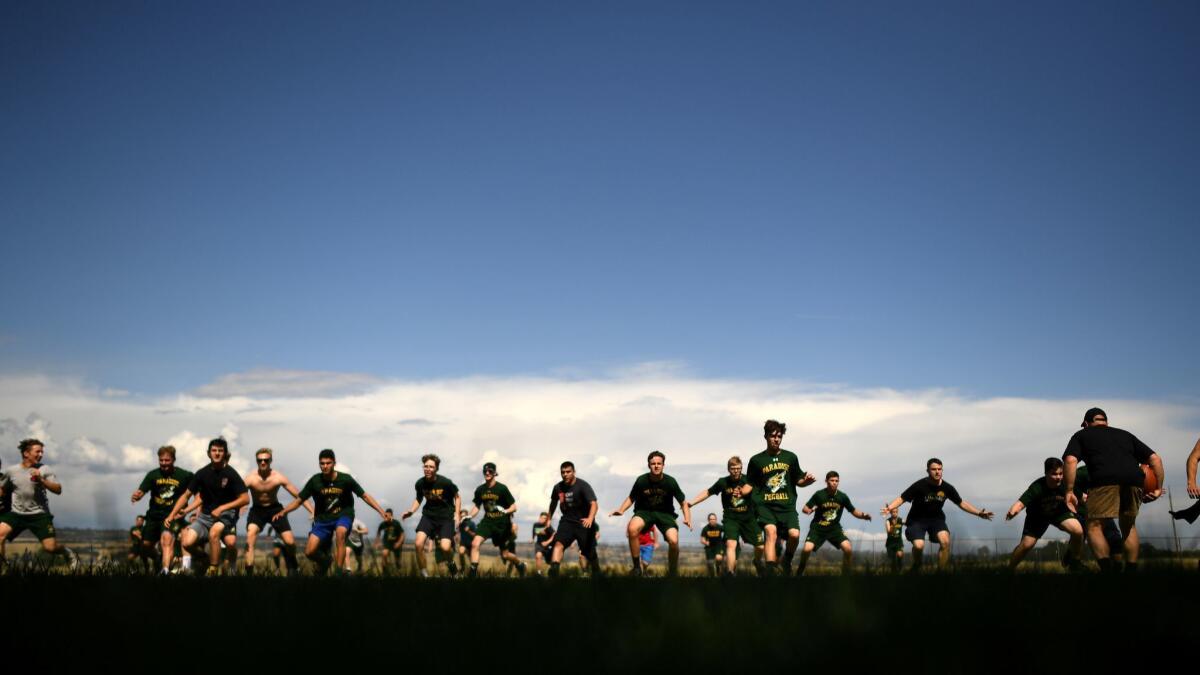
It wasnât until later that Prinz learned that his home had survived the fire. Like everyone, his life was in limbo, and figuring out football was impossible.
âI couldnât focus on the game in any way, shape or form,ââ he said. âAnd I have to be more focused than anybody. I was like, âGuys, we just canât do this.âââ
Six months later, his team remains filled with remorse over the cancellation, although even those seniors who lost their championship hopes forever say they understand.
âWe never had our chance, we never had our shot â it really hurt,ââ says Trevor Curtis, senior captain and center. âIf I could play right now, Iâd play, Iâd pad it up right now.ââ
He pauses and sighs. âBut everybody had lost everything.ââ
Four days after the fire, the team was invited to a San Francisco 49ers game, where they stood alongside the NFL giants for the national anthem. Then in early January, Prinz organized a potluck team banquet at a Chico catering hall. It featured fried chicken, casseroles, pizza, sodas and tears. It was an improvised celebration of a terminated season. It was the best banquet any of them could remember.
âIt was so authentic, so raw,ââ Prinz says. âWe all had our terrible evacuation stories, yet we were all there together, we all made it; it was like pure family.ââ
These days, his players are truly brothers to the bone. They cling to one another. They cling to Prinz. During a recent school day, a steady stream of players and other students approached Prinz at his desk seeking encouragement or advice.
In the classroom, like many Paradise students, his players are often lost. The warehouse is loud and distracting. You can hear numerous teachers talking over dividers. Their grades are suffering. If it wasnât for football, some of the players say they wouldnât show up at all.
âI honestly see a little bit of post-traumatic stress in them,ââ Prinz says. âTheyâre a little bit different. Theyâre not as focused.
âTheyâre thinking about a lot of other things. Where are they going to stay? Is their family going to move? What happens now?ââ
Their plight is epitomized by Stetson Morgan, a sophomore running back who sleeps on a fold-out couch in a modest trailer in the frontyard of his grandmotherâs farmhouse. He shares the cramped box with his parents and older brother. Thereâs no internet. Thereâs no TV. His few clothes are stuffed in a cabinet above the couch. He lost all of his sports plaques and medals, his personal wall of fame destroyed with his youth. He gets angry. He spends a couple of nights a week sleeping elsewhere.
âI donât know how I handle it, I just keep it all down. Everything comes out when I play football.â
— Stetson Morgan
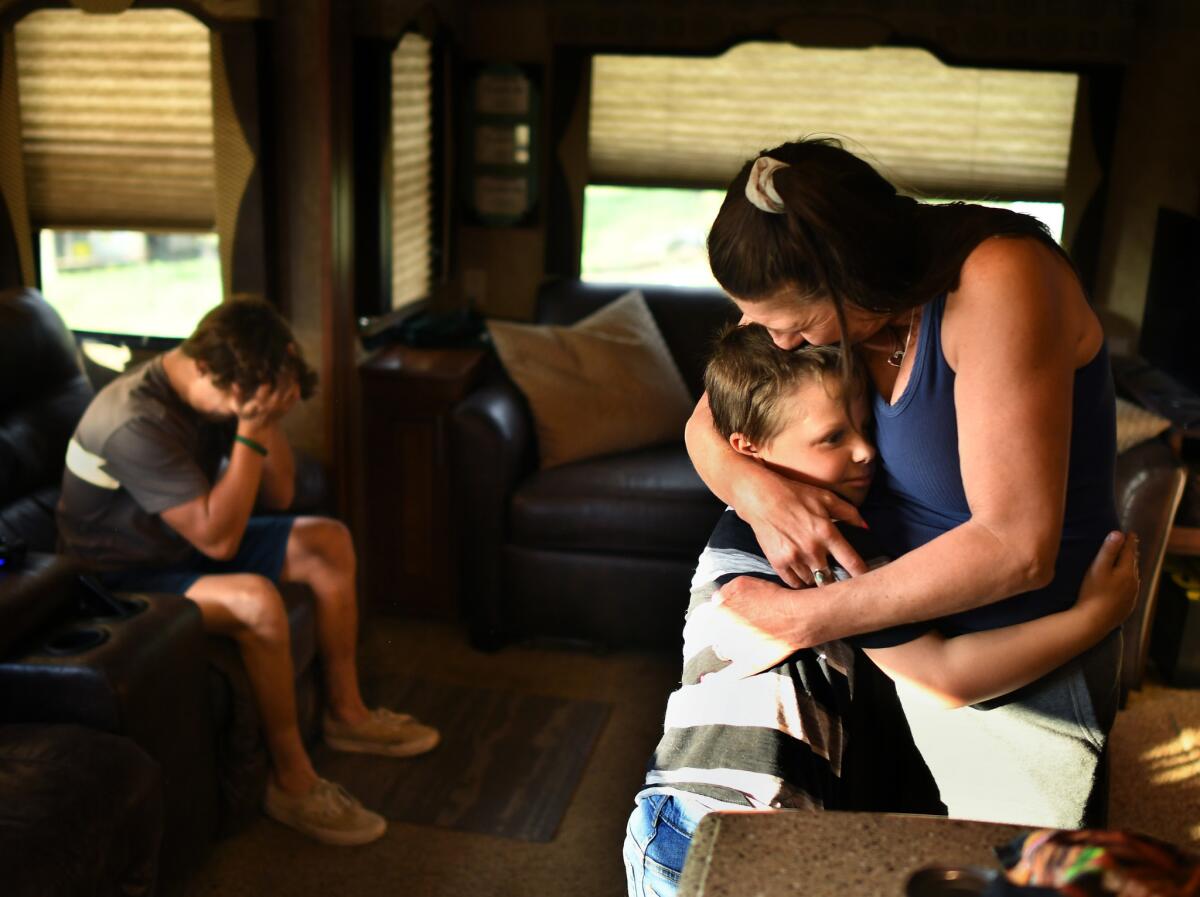
âI donât know how I handle it, I just keep it all down,ââ Morgan says. âEverything comes out when I play football. Everything that is held down, it gets released on that field. I wish I still had my house.ââ
Their spring practices at Marsh Junior High in Chico ended Friday. They will be allowed to return up the hill to their school field to begin their summer program June 10. Official fall practice will begin Aug. 5. Their first game will be Aug. 23 at Om Wraith against Williams, and you wonât want to miss it.
âThe emotion of that game will raise the hair on your neck,ââ Greg Kiefer says. âCome on up. Iâll give you my seat.ââ
That emotion was overwhelming on a recent day at Marsh, where everyone happily raced past the confusion in their lives to the stability of a stance or the familiarity of a formation. Even when they are hauling insurance-purchased and donated equipment out of a temporary shed, they run.
High in the distant hills, their town still looks like a disaster. The streets are lined with the skeletons of burned cars, the sooty rubble of demolished stores, brick chimneys standing as eerie sentries over piles of melted kitchens and bathrooms and life. It will be years before Paradise is whole again.
Sign up for our daily sports newsletter Âť
But down here on the practice field, the shouting young Bobcats celebrate in the safety, the tradition, the football.
âWe were all a mess, and Iâm still lost,ââ offensive line coach Andy Hopper says thickly, looking up toward the hills and wincing behind sunglasses. He lost his home and is living in a trailer with his wife and two children, including Paradise center Riley.
âI donât know exactly where the Lord wants me to be,ââ Hopper says, âbut I know itâs out here with these boys spreading love, being a family, all of us here for each other.ââ
As practice ends, they huddle one last time, locking their arms together for one more chant.
âPick your brother up!ââ they shout in unison, loud enough to be heard among the charred ruins up the hill, a fight engaged.
Get more of Bill Plaschkeâs work and follow him on Twitter @BillPlaschke
More to Read
Go beyond the scoreboard
Get the latest on L.A.'s teams in the daily Sports Report newsletter.
You may occasionally receive promotional content from the Los Angeles Times.

